Для начала создаём namespase elk
kubectl create namespace elk
ну или
cat namespace.yml
kind: Namespace
apiVersion: v1
metadata:
name: elkkubectl apply -f namespace.yml
выкачиваем чарт
git clone https://github.com/elastic/helm-charts.git
cd helm-charts/
git checkout 7.9
Далее нам надо сгенерировать сертификаты на основе которых будет всё работать.
[root@prod-vsrv-kubemaster1 helm-charts]# mkdir mkdir /certs
[root@prod-vsrv-kubemaster1 helm-charts]# cd /certs/
Создаём файл в котором укажем наши доменные имена (logstash требователен к наличию домена в сертификате)
cat cnf
[req]
distinguished_name = req_distinguished_name
x509_extensions = v3_req
prompt = no
[req_distinguished_name]
C = KG
ST = Bishkek
L = Bishkek
O = test
CN = elasticsearch-master
[v3_req]
subjectKeyIdentifier = hash
authorityKeyIdentifier = keyid,issuer
basicConstraints = CA:TRUE
subjectAltName = @alt_names
[alt_names]
DNS.1 = elasticsearch-master
DNS.2 = kibana-kibana
DNS.3 = elasticsearch-master-headless
DNS.4 = logstash-logstash-headless
DNS.5 = elk.prod.test.local
DNS.6 = elasticsearch-master-0
DNS.7 = elasticsearch-master-1
DNS.8 = elasticsearch-master-2
openssl genpkey -aes-256-cbc -pass pass:123456789 -algorithm RSA -out mysite.key -pkeyopt rsa_keygen_bits:3072
Тут надо будет ввести пароль при генерации а дальше заполнить данные сертификата.
Я везде задал пароль 123456789
openssl req -new -x509 -key mysite.key -sha256 -config cnf -out mysite.crt -days 7300
Enter pass phrase for mysite.key:
создаём сертификат p12 который нужен elastic
openssl pkcs12 -export -in mysite.crt -inkey mysite.key -out identity.p12 -name «mykey»
Enter pass phrase for mysite.key: вот тут вводим наш пароль 123456789
Enter Export Password: ТУТ ОСТАВЛЯЕМ БЕЗ ПАРОЛЯ
Verifying — Enter Export Password: ТУТ ОСТАВЛЯЕМ БЕЗ ПАРОЛЯ
docker run —rm -v /certs:/certs -it openjdk:oracle keytool -import -file /certs/mysite.crt -keystore /certs/trust.jks -storepass 123456789
появится сообщение в котором мы соглашаемся, что доверяем сертификату
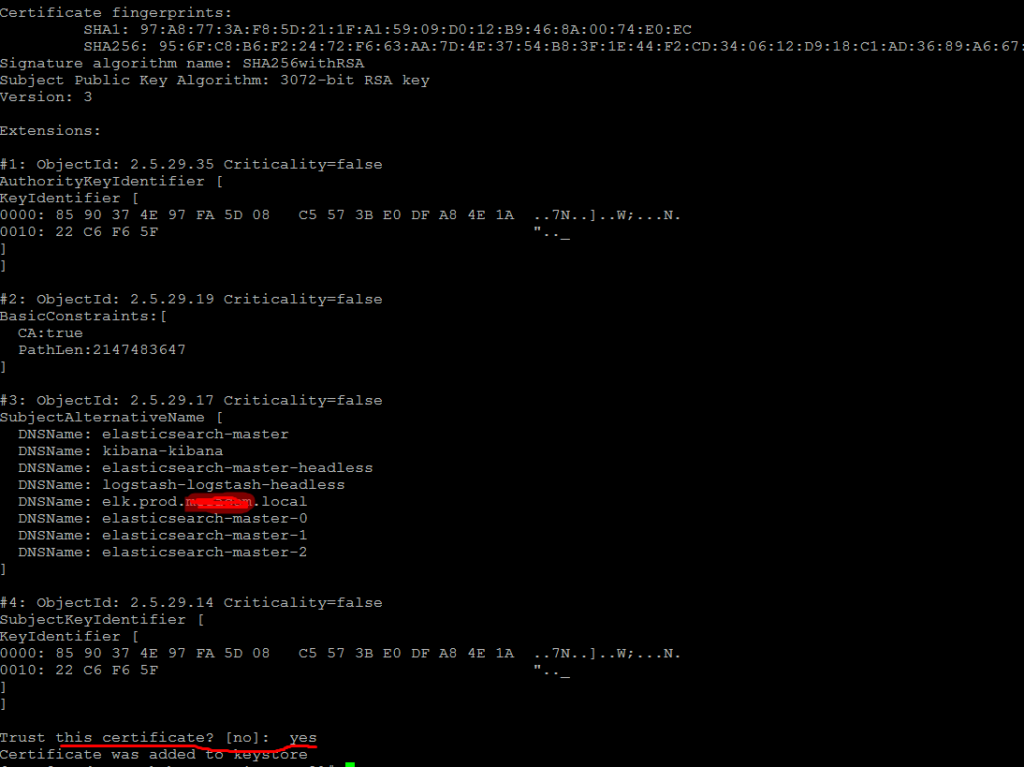
Вытаскиваем приватный ключ чтоб он у нас был без пароля
openssl rsa -in mysite.key -out mysite-without-pass.key
Enter pass phrase for mysite.key:
writing RSA key
Всё готово, все нужные сертификаты для elasticsearch сгенерированы:
[root@prod-vsrv-kubemaster1 certs]# ll
total 32
-rw-r—r— 1 root root 575 Feb 10 10:15 cnf
-rw-r—r— 1 root root 3624 Feb 10 10:15 identity.p12
-rw-r—r— 1 root root 1935 Feb 10 10:15 mysite.crt
-rw-r—r— 1 root root 2638 Feb 10 10:15 mysite.key
-rw-r—r— 1 root root 2459 Feb 10 10:39 mysite-without-pass.key
-rw-r—r— 1 root root 1682 Feb 10 10:15 trust.jks
Создаём секрет с сертификатами
[root@prod-vsrv-kubemaster1 certs]# kubectl create secret generic elastic-certificates -n elk —from-file=identity.p12 —from-file=mysite.crt —from-file=mysite.key —from-file=mysite-without-pass.key —from-file=trust.jks
Создаём секрет с логином и паролем для elastic:
kubectl create secret generic secret-basic-auth -n elk —from-literal=password=elastic —from-literal=username=elastic
отметим что у нас в кластере уже установлен nfs-provisioner
Перейдём к настройке переменных у elastic
elasticsearch/values.yaml
Тут включаем xpack добавляем сертификаты и указываем директорию для снапшотов
esConfig:
elasticsearch.yml: |
path.repo: /snapshot
xpack.security.enabled: true
xpack.security.transport.ssl.enabled: true
xpack.security.transport.ssl.verification_mode: certificate
xpack.security.transport.ssl.keystore.path: /usr/share/elasticsearch/config/certs/identity.p12
xpack.security.transport.ssl.truststore.path: /usr/share/elasticsearch/config/certs/identity.p12
xpack.security.http.ssl.enabled: true
xpack.security.http.ssl.truststore.path: /usr/share/elasticsearch/config/certs/identity.p12
xpack.security.http.ssl.keystore.path: /usr/share/elasticsearch/config/certs/identity.p12
path.repo: /snapshot — это наша директория для снапшотов, они будут сохраняться в отдельном volume
также добавляем в переменные наш логин и пароль что мы указали при создании секрета
extraEnvs:
- name: ELASTIC_PASSWORD
valueFrom:
secretKeyRef:
name: secret-basic-auth
key: password
- name: ELASTIC_USERNAME
valueFrom:
secretKeyRef:
name: secret-basic-auth
key: username
также подключаем директорию для сертификатов
secretMounts:
- name: elastic-certificates
secretName: elastic-certificates
path: /usr/share/elasticsearch/config/certs
также указываем наш nfs провижинер
volumeClaimTemplate:
accessModes: [ "ReadWriteOnce" ]
storageClassName: nfs-storageclass
resources:
requests:
storage: 3Giтакже выставляем antiAffinity soft (так как у нас 2 воркера а эластик запускается в 3х подах он не может стартануть) эта настройка говорит что на одной ноде могут быть запущены 2 пода из кластера уэластика.
antiAffinity: «soft»
также правим протокол на https
protocol: https
весь файл будет иметь следующий вид:
[root@prod-vsrv-kubemaster1 helm-charts]# cat elasticsearch/values.yaml
---
clusterName: "elasticsearch"
nodeGroup: "master"
# The service that non master groups will try to connect to when joining the cluster
# This should be set to clusterName + "-" + nodeGroup for your master group
masterService: ""
# Elasticsearch roles that will be applied to this nodeGroup
# These will be set as environment variables. E.g. node.master=true
roles:
master: "true"
ingest: "true"
data: "true"
remote_cluster_client: "true"
# ml: "true" # ml is not availble with elasticsearch-oss
replicas: 3
minimumMasterNodes: 2
esMajorVersion: ""
# Allows you to add any config files in /usr/share/elasticsearch/config/
# such as elasticsearch.yml and log4j2.properties
esConfig:
elasticsearch.yml: |
path.repo: /snapshot
xpack.security.enabled: true
xpack.security.transport.ssl.enabled: true
xpack.security.transport.ssl.verification_mode: certificate
xpack.security.transport.ssl.keystore.path: /usr/share/elasticsearch/config/certs/identity.p12
xpack.security.transport.ssl.truststore.path: /usr/share/elasticsearch/config/certs/identity.p12
xpack.security.http.ssl.enabled: true
xpack.security.http.ssl.truststore.path: /usr/share/elasticsearch/config/certs/identity.p12
xpack.security.http.ssl.keystore.path: /usr/share/elasticsearch/config/certs/identity.p12
# key:
# nestedkey: value
# log4j2.properties: |
# key = value
# Extra environment variables to append to this nodeGroup
# This will be appended to the current 'env:' key. You can use any of the kubernetes env
# syntax here
extraEnvs:
- name: ELASTIC_PASSWORD
valueFrom:
secretKeyRef:
name: secret-basic-auth
key: password
- name: ELASTIC_USERNAME
valueFrom:
secretKeyRef:
name: secret-basic-auth
key: username
# - name: MY_ENVIRONMENT_VAR
# value: the_value_goes_here
# Allows you to load environment variables from kubernetes secret or config map
envFrom: []
# - secretRef:
# name: env-secret
# - configMapRef:
# name: config-map
# A list of secrets and their paths to mount inside the pod
# This is useful for mounting certificates for security and for mounting
# the X-Pack license
secretMounts:
- name: elastic-certificates
secretName: elastic-certificates
path: /usr/share/elasticsearch/config/certs
# defaultMode: 0755
image: "docker.elastic.co/elasticsearch/elasticsearch"
imageTag: "7.9.4-SNAPSHOT"
imagePullPolicy: "IfNotPresent"
podAnnotations: {}
# iam.amazonaws.com/role: es-cluster
# additionals labels
labels: {}
esJavaOpts: "-Xmx1g -Xms1g"
resources:
requests:
cpu: "1000m"
memory: "2Gi"
limits:
cpu: "1000m"
memory: "2Gi"
initResources: {}
# limits:
# cpu: "25m"
# # memory: "128Mi"
# requests:
# cpu: "25m"
# memory: "128Mi"
sidecarResources: {}
# limits:
# cpu: "25m"
# # memory: "128Mi"
# requests:
# cpu: "25m"
# memory: "128Mi"
networkHost: "0.0.0.0"
volumeClaimTemplate:
accessModes: [ "ReadWriteOnce" ]
storageClassName: nfs-storageclass
resources:
requests:
storage: 3Gi
rbac:
create: false
serviceAccountAnnotations: {}
serviceAccountName: ""
podSecurityPolicy:
create: false
name: ""
spec:
privileged: true
fsGroup:
rule: RunAsAny
runAsUser:
rule: RunAsAny
seLinux:
rule: RunAsAny
supplementalGroups:
rule: RunAsAny
volumes:
- secret
- configMap
- persistentVolumeClaim
persistence:
enabled: true
labels:
# Add default labels for the volumeClaimTemplate fo the StatefulSet
enabled: false
annotations: {}
extraVolumes: []
# - name: extras
# emptyDir: {}
extraVolumeMounts: []
# - name: extras
# mountPath: /usr/share/extras
# readOnly: true
extraContainers: []
# - name: do-something
# image: busybox
# command: ['do', 'something']
extraInitContainers: []
# - name: do-something
# image: busybox
# command: ['do', 'something']
# This is the PriorityClass settings as defined in
# https://kubernetes.io/docs/concepts/configuration/pod-priority-preemption/#priorityclass
priorityClassName: ""
# By default this will make sure two pods don't end up on the same node
# Changing this to a region would allow you to spread pods across regions
antiAffinityTopologyKey: "kubernetes.io/hostname"
# Hard means that by default pods will only be scheduled if there are enough nodes for them
# and that they will never end up on the same node. Setting this to soft will do this "best effort"
antiAffinity: "soft"
# This is the node affinity settings as defined in
# https://kubernetes.io/docs/concepts/configuration/assign-pod-node/#node-affinity-beta-feature
nodeAffinity: {}
# The default is to deploy all pods serially. By setting this to parallel all pods are started at
# the same time when bootstrapping the cluster
podManagementPolicy: "Parallel"
# The environment variables injected by service links are not used, but can lead to slow Elasticsearch boot times when
# there are many services in the current namespace.
# If you experience slow pod startups you probably want to set this to `false`.
enableServiceLinks: true
protocol: https
httpPort: 9200
transportPort: 9300
service:
labels: {}
labelsHeadless: {}
type: ClusterIP
nodePort: ""
annotations: {}
httpPortName: http
transportPortName: transport
loadBalancerIP: ""
loadBalancerSourceRanges: []
externalTrafficPolicy: ""
updateStrategy: RollingUpdate
# This is the max unavailable setting for the pod disruption budget
# The default value of 1 will make sure that kubernetes won't allow more than 1
# of your pods to be unavailable during maintenance
maxUnavailable: 1
podSecurityContext:
fsGroup: 1000
runAsUser: 1000
securityContext:
capabilities:
drop:
- ALL
# readOnlyRootFilesystem: true
runAsNonRoot: true
runAsUser: 1000
# How long to wait for elasticsearch to stop gracefully
terminationGracePeriod: 120
sysctlVmMaxMapCount: 262144
readinessProbe:
failureThreshold: 3
initialDelaySeconds: 10
periodSeconds: 10
successThreshold: 3
timeoutSeconds: 5
# https://www.elastic.co/guide/en/elasticsearch/reference/7.9/cluster-health.html#request-params wait_for_status
clusterHealthCheckParams: "wait_for_status=green&timeout=1s"
## Use an alternate scheduler.
## ref: https://kubernetes.io/docs/tasks/administer-cluster/configure-multiple-schedulers/
##
schedulerName: ""
imagePullSecrets: []
nodeSelector: {}
tolerations: []
# Enabling this will publically expose your Elasticsearch instance.
# Only enable this if you have security enabled on your cluster
ingress:
enabled: false
annotations: {}
# kubernetes.io/ingress.class: nginx
# kubernetes.io/tls-acme: "true"
path: /
hosts:
- chart-example.local
tls: []
# - secretName: chart-example-tls
# hosts:
# - chart-example.local
nameOverride: ""
fullnameOverride: ""
# https://github.com/elastic/helm-charts/issues/63
masterTerminationFix: false
lifecycle: {}
# preStop:
# exec:
# command: ["/bin/sh", "-c", "echo Hello from the postStart handler > /usr/share/message"]
# postStart:
# exec:
# command:
# - bash
# - -c
# - |
# #!/bin/bash
# # Add a template to adjust number of shards/replicas
# TEMPLATE_NAME=my_template
# INDEX_PATTERN="logstash-*"
# SHARD_COUNT=8
# REPLICA_COUNT=1
# ES_URL=http://localhost:9200
# while [[ "$(curl -s -o /dev/null -w '%{http_code}\n' $ES_URL)" != "200" ]]; do sleep 1; done
# curl -XPUT "$ES_URL/_template/$TEMPLATE_NAME" -H 'Content-Type: application/json' -d'{"index_patterns":['\""$INDEX_PATTERN"\"'],"settings":{"number_of_shards":'$SHARD_COUNT',"number_of_replicas":'$REPLICA_COUNT'}}'
sysctlInitContainer:
enabled: true
keystore: []
# Deprecated
# please use the above podSecurityContext.fsGroup instead
fsGroup: ""
========================================================================================
перейдём к настройке kibana:
kibana/values.yaml
Правим http на https
elasticsearchHosts: «https://elasticsearch-master:9200»
также
extraEnvs:
- name: 'ELASTICSEARCH_USERNAME'
valueFrom:
secretKeyRef:
name: secret-basic-auth
key: username
- name: 'ELASTICSEARCH_PASSWORD'
valueFrom:
secretKeyRef:
name: secret-basic-auth
key: password
также подключаем директорию с сертификатами
secretMounts:
- name: elastic-certificates
secretName: elastic-certificates
path: /usr/share/kibana/config/certs
также добавляем в основной конфиг пути до сертификатов
kibanaConfig:
kibana.yml: |
server.ssl:
enabled: true
key: /usr/share/kibana/config/certs/mysite-without-pass.key
certificate: /usr/share/kibana/config/certs/mysite.crt
xpack.security.encryptionKey: "something_at_least_32_characters"
elasticsearch.ssl:
certificateAuthorities: /usr/share/kibana/config/certs/mysite.crt
verificationMode: certificate
также настраиваем ingress чтобы по нашему домену открывалась кибана, отметим что строка:
nginx.ingress.kubernetes.io/backend-protocol: «HTTPS»
обязательна так как без неё ингрес по умолчанию проксирует всё на HTTP
ingress:
enabled: true
annotations:
# kubernetes.io/ingress.class: nginx
# kubernetes.io/tls-acme: "true"
nginx.ingress.kubernetes.io/backend-protocol: "HTTPS"
path: /
hosts:
- elk.prod.test.local
весь файл будет иметь вид:
cat kibana/values.yaml
---
elasticsearchHosts: "https://elasticsearch-master:9200"
replicas: 1
# Extra environment variables to append to this nodeGroup
# This will be appended to the current 'env:' key. You can use any of the kubernetes env
# syntax here
extraEnvs:
- name: 'ELASTICSEARCH_USERNAME'
valueFrom:
secretKeyRef:
name: secret-basic-auth
key: username
- name: 'ELASTICSEARCH_PASSWORD'
valueFrom:
secretKeyRef:
name: secret-basic-auth
key: password
# - name: "NODE_OPTIONS"
# value: "--max-old-space-size=1800"
# - name: MY_ENVIRONMENT_VAR
# value: the_value_goes_here
# Allows you to load environment variables from kubernetes secret or config map
envFrom: []
# - secretRef:
# name: env-secret
# - configMapRef:
# name: config-map
# A list of secrets and their paths to mount inside the pod
# This is useful for mounting certificates for security and for mounting
# the X-Pack license
secretMounts:
- name: elastic-certificates
secretName: elastic-certificates
path: /usr/share/kibana/config/certs
# - name: kibana-keystore
# secretName: kibana-keystore
# path: /usr/share/kibana/data/kibana.keystore
# subPath: kibana.keystore # optional
image: "docker.elastic.co/kibana/kibana"
imageTag: "7.9.4-SNAPSHOT"
imagePullPolicy: "IfNotPresent"
# additionals labels
labels: {}
podAnnotations: {}
# iam.amazonaws.com/role: es-cluster
resources:
requests:
cpu: "1000m"
memory: "2Gi"
limits:
cpu: "1000m"
memory: "2Gi"
protocol: https
serverHost: "0.0.0.0"
healthCheckPath: "/app/kibana"
# Allows you to add any config files in /usr/share/kibana/config/
# such as kibana.yml
kibanaConfig:
kibana.yml: |
server.ssl:
enabled: true
key: /usr/share/kibana/config/certs/mysite-without-pass.key
certificate: /usr/share/kibana/config/certs/mysite.crt
xpack.security.encryptionKey: "something_at_least_32_characters"
elasticsearch.ssl:
certificateAuthorities: /usr/share/kibana/config/certs/mysite.crt
verificationMode: certificate
# kibana.yml: |
# key:
# nestedkey: value
# If Pod Security Policy in use it may be required to specify security context as well as service account
podSecurityContext:
fsGroup: 1000
securityContext:
capabilities:
drop:
- ALL
# readOnlyRootFilesystem: true
runAsNonRoot: true
runAsUser: 1000
serviceAccount: ""
# This is the PriorityClass settings as defined in
# https://kubernetes.io/docs/concepts/configuration/pod-priority-preemption/#priorityclass
priorityClassName: ""
httpPort: 5601
extraContainers: ""
# - name: dummy-init
# image: busybox
# command: ['echo', 'hey']
extraInitContainers: ""
# - name: dummy-init
# image: busybox
# command: ['echo', 'hey']
updateStrategy:
type: "Recreate"
service:
type: ClusterIP
loadBalancerIP: ""
port: 5601
nodePort: ""
labels: {}
annotations: {}
# cloud.google.com/load-balancer-type: "Internal"
# service.beta.kubernetes.io/aws-load-balancer-internal: 0.0.0.0/0
# service.beta.kubernetes.io/azure-load-balancer-internal: "true"
# service.beta.kubernetes.io/openstack-internal-load-balancer: "true"
# service.beta.kubernetes.io/cce-load-balancer-internal-vpc: "true"
loadBalancerSourceRanges: []
# 0.0.0.0/0
ingress:
enabled: true
annotations:
# kubernetes.io/ingress.class: nginx
# kubernetes.io/tls-acme: "true"
nginx.ingress.kubernetes.io/backend-protocol: "HTTPS"
path: /
hosts:
- elk.prod.test.local
tls: []
# - secretName: chart-example-tls
# hosts:
# - chart-example.local
readinessProbe:
failureThreshold: 3
initialDelaySeconds: 10
periodSeconds: 10
successThreshold: 3
timeoutSeconds: 5
imagePullSecrets: []
nodeSelector: {}
tolerations: []
affinity: {}
nameOverride: ""
fullnameOverride: ""
lifecycle: {}
# preStop:
# exec:
# command: ["/bin/sh", "-c", "echo Hello from the postStart handler > /usr/share/message"]
# postStart:
# exec:
# command: ["/bin/sh", "-c", "echo Hello from the postStart handler > /usr/share/message"]
# Deprecated - use only with versions < 6.6
elasticsearchURL: "" # "http://elasticsearch-master:9200"
==========================================================================================
перейдём к настройке logstash
logstash/values.yaml
включаем xpack
logstashConfig:
logstash.yml: |
http.host: 0.0.0.0
xpack.monitoring.enabled: true
xpack.monitoring.elasticsearch.username: '${ELASTICSEARCH_USERNAME}'
xpack.monitoring.elasticsearch.password: '${ELASTICSEARCH_PASSWORD}'
xpack.monitoring.elasticsearch.hosts: [ "https://elasticsearch-master:9200" ]
xpack.monitoring.elasticsearch.ssl.certificate_authority: /usr/share/logstash/config/certs/mysite.crt
также настраиваем приём на порт 5045 так как 5044 поднимается автоматически и если оставить input с 5044 то будет конфликт портов, настраиваем также фильтр по неймспейсу если приходят логи из неймспейса terminal-soft мы к ним добавляем тэг, убираем пару лишних полей и отправляем в ластик, указывая имя индекса имя ilm политики -которая должна быть предварительно создана.
logstashPipeline:
logstash.conf: |
input {
exec { command => "uptime" interval => 30 }
beats {
port => 5045
}
}
filter {
if [kubernetes][namespace] == "terminal-soft" {
mutate {
add_tag => "tag-terminal-soft"
remove_field => ["[agent][name]","[agent][version]","[host][mac]","[host][ip]"] }
}
}
output {
if "tag-terminal-soft" in [tags] {
elasticsearch {
hosts => [ "https://elasticsearch-master:9200" ]
cacert => "/usr/share/logstash/config/certs/mysite.crt"
manage_template => false
index => "terminal-soft-%{+YYYY.MM.dd}"
ilm_rollover_alias => "terminal-soft"
ilm_policy => "terminal-soft"
user => '${ELASTICSEARCH_USERNAME}'
password => '${ELASTICSEARCH_PASSWORD}'
}
}
}
также указываем логин пароль с которым будем подключаться к elasticearch
extraEnvs:
- name: 'ELASTICSEARCH_USERNAME'
valueFrom:
secretKeyRef:
name: secret-basic-auth
key: username
- name: 'ELASTICSEARCH_PASSWORD'
valueFrom:
secretKeyRef:
name: secret-basic-auth
key: password
также
secretMounts:
- name: elastic-certificates
secretName: elastic-certificates
path: /usr/share/logstash/config/certs
также
antiAffinity: «soft»
также раскоментим сервис и укажем в нём порт куда всё пересылать 5045 (его мы задали выше в input)
service:
annotations: {}
type: ClusterIP
ports:
- name: beats
port: 5044
protocol: TCP
targetPort: 5045
весь файл имеет вид:
[root@prod-vsrv-kubemaster1 helm-charts]# cat logstash/values.yaml
---
replicas: 1
# Allows you to add any config files in /usr/share/logstash/config/
# such as logstash.yml and log4j2.properties
#
# Note that when overriding logstash.yml, `http.host: 0.0.0.0` should always be included
# to make default probes work.
logstashConfig:
logstash.yml: |
http.host: 0.0.0.0
xpack.monitoring.enabled: true
xpack.monitoring.elasticsearch.username: '${ELASTICSEARCH_USERNAME}'
xpack.monitoring.elasticsearch.password: '${ELASTICSEARCH_PASSWORD}'
xpack.monitoring.elasticsearch.hosts: [ "https://elasticsearch-master:9200" ]
xpack.monitoring.elasticsearch.ssl.certificate_authority: /usr/share/logstash/config/certs/mysite.crt
# key:
# nestedkey: value
# log4j2.properties: |
# key = value
# Allows you to add any pipeline files in /usr/share/logstash/pipeline/
### ***warn*** there is a hardcoded logstash.conf in the image, override it first
logstashPipeline:
logstash.conf: |
input {
exec { command => "uptime" interval => 30 }
beats {
port => 5045
}
}
filter {
if [kubernetes][namespace] == "terminal-soft" {
mutate {
add_tag => "tag-terminal-soft"
remove_field => ["[agent][name]","[agent][version]","[host][mac]","[host][ip]"] }
}
}
output {
if "tag-terminal-soft" in [tags] {
elasticsearch {
hosts => [ "https://elasticsearch-master:9200" ]
cacert => "/usr/share/logstash/config/certs/mysite.crt"
manage_template => false
index => "terminal-soft-%{+YYYY.MM.dd}"
ilm_rollover_alias => "terminal-soft"
ilm_policy => "terminal-soft"
user => '${ELASTICSEARCH_USERNAME}'
password => '${ELASTICSEARCH_PASSWORD}'
}
}
}
# input {
# exec {
# command => "uptime"
# interval => 30
# }
# }
# output { stdout { } }
# Extra environment variables to append to this nodeGroup
# This will be appended to the current 'env:' key. You can use any of the kubernetes env
# syntax here
extraEnvs:
- name: 'ELASTICSEARCH_USERNAME'
valueFrom:
secretKeyRef:
name: secret-basic-auth
key: username
- name: 'ELASTICSEARCH_PASSWORD'
valueFrom:
secretKeyRef:
name: secret-basic-auth
key: password
# - name: MY_ENVIRONMENT_VAR
# value: the_value_goes_here
# Allows you to load environment variables from kubernetes secret or config map
envFrom: []
# - secretRef:
# name: env-secret
# - configMapRef:
# name: config-map
# Add sensitive data to k8s secrets
secrets: []
# - name: "env"
# value:
# ELASTICSEARCH_PASSWORD: "LS1CRUdJTiBgUFJJVkFURSB"
# api_key: ui2CsdUadTiBasRJRkl9tvNnw
# - name: "tls"
# value:
# ca.crt: |
# LS0tLS1CRUdJT0K
# LS0tLS1CRUdJT0K
# LS0tLS1CRUdJT0K
# LS0tLS1CRUdJT0K
# cert.crt: "LS0tLS1CRUdJTiBlRJRklDQVRFLS0tLS0K"
# cert.key.filepath: "secrets.crt" # The path to file should be relative to the `values.yaml` file.
# A list of secrets and their paths to mount inside the pod
secretMounts:
- name: elastic-certificates
secretName: elastic-certificates
path: /usr/share/logstash/config/certs
image: "docker.elastic.co/logstash/logstash"
imageTag: "7.9.4-SNAPSHOT"
imagePullPolicy: "IfNotPresent"
imagePullSecrets: []
podAnnotations: {}
# additionals labels
labels: {}
logstashJavaOpts: "-Xmx1g -Xms1g"
resources:
requests:
cpu: "100m"
memory: "1536Mi"
limits:
cpu: "1000m"
memory: "1536Mi"
volumeClaimTemplate:
accessModes: [ "ReadWriteOnce" ]
resources:
requests:
storage: 1Gi
rbac:
create: false
serviceAccountAnnotations: {}
serviceAccountName: ""
podSecurityPolicy:
create: false
name: ""
spec:
privileged: true
fsGroup:
rule: RunAsAny
runAsUser:
rule: RunAsAny
seLinux:
rule: RunAsAny
supplementalGroups:
rule: RunAsAny
volumes:
- secret
- configMap
- persistentVolumeClaim
persistence:
enabled: false
annotations: {}
extraVolumes: ""
# - name: extras
# emptyDir: {}
extraVolumeMounts: ""
# - name: extras
# mountPath: /usr/share/extras
# readOnly: true
extraContainers: ""
# - name: do-something
# image: busybox
# command: ['do', 'something']
extraInitContainers: ""
# - name: do-something
# image: busybox
# command: ['do', 'something']
# This is the PriorityClass settings as defined in
# https://kubernetes.io/docs/concepts/configuration/pod-priority-preemption/#priorityclass
priorityClassName: ""
# By default this will make sure two pods don't end up on the same node
# Changing this to a region would allow you to spread pods across regions
antiAffinityTopologyKey: "kubernetes.io/hostname"
# Hard means that by default pods will only be scheduled if there are enough nodes for them
# and that they will never end up on the same node. Setting this to soft will do this "best effort"
antiAffinity: "soft"
# This is the node affinity settings as defined in
# https://kubernetes.io/docs/concepts/configuration/assign-pod-node/#node-affinity-beta-feature
nodeAffinity: {}
# The default is to deploy all pods serially. By setting this to parallel all pods are started at
# the same time when bootstrapping the cluster
podManagementPolicy: "Parallel"
httpPort: 9600
# Custom ports to add to logstash
extraPorts: []
# - name: beats
# containerPort: 5044
updateStrategy: RollingUpdate
# This is the max unavailable setting for the pod disruption budget
# The default value of 1 will make sure that kubernetes won't allow more than 1
# of your pods to be unavailable during maintenance
maxUnavailable: 1
podSecurityContext:
fsGroup: 1000
runAsUser: 1000
securityContext:
capabilities:
drop:
- ALL
# readOnlyRootFilesystem: true
runAsNonRoot: true
runAsUser: 1000
# How long to wait for logstash to stop gracefully
terminationGracePeriod: 120
# Probes
# Default probes are using `httpGet` which requires that `http.host: 0.0.0.0` is part of
# `logstash.yml`. If needed probes can be disabled or overrided using the following syntaxes:
#
# disable livenessProbe
# livenessProbe: null
#
# replace httpGet default readinessProbe by some exec probe
# readinessProbe:
# httpGet: null
# exec:
# command:
# - curl
# - localhost:9600
livenessProbe:
httpGet:
path: /
port: http
initialDelaySeconds: 300
periodSeconds: 10
timeoutSeconds: 5
failureThreshold: 3
successThreshold: 1
readinessProbe:
httpGet:
path: /
port: http
initialDelaySeconds: 60
periodSeconds: 10
timeoutSeconds: 5
failureThreshold: 3
successThreshold: 3
## Use an alternate scheduler.
## ref: https://kubernetes.io/docs/tasks/administer-cluster/configure-multiple-schedulers/
##
schedulerName: ""
nodeSelector: {}
tolerations: []
nameOverride: ""
fullnameOverride: ""
lifecycle: {}
# preStop:
# exec:
# command: ["/bin/sh", "-c", "echo Hello from the postStart handler > /usr/share/message"]
# postStart:
# exec:
# command: ["/bin/sh", "-c", "echo Hello from the postStart handler > /usr/share/message"]
service:
annotations: {}
type: ClusterIP
ports:
- name: beats
port: 5044
protocol: TCP
targetPort: 5045
# - name: http
# port: 8080
# protocol: TCP
# targetPort: 8080
ingress:
enabled: false
# annotations: {}
# hosts:
# - host: logstash.local
# paths:
# - path: /logs
# servicePort: 8080
# tls: []
===========================================================================================
Перейдём к настройке filebeat
filebeat/values.yaml
filebeatConfig:
filebeat.yml: |
filebeat.inputs:
- type: container
paths:
- /var/log/containers/*.log
processors:
- add_kubernetes_metadata:
host: ${NODE_NAME}
matchers:
- logs_path:
logs_path: "/var/log/containers/"
output.logstash:
enabled: true
hosts: ["logstash-logstash:5044"]
полностью файл будет выглядеть следующим образом:
[root@prod-vsrv-kubemaster1 helm-charts]# cat filebeat/values.yaml
---
# Allows you to add any config files in /usr/share/filebeat
# such as filebeat.yml
filebeatConfig:
filebeat.yml: |
filebeat.inputs:
- type: container
paths:
- /var/log/containers/*.log
processors:
- add_kubernetes_metadata:
host: ${NODE_NAME}
matchers:
- logs_path:
logs_path: "/var/log/containers/"
output.logstash:
enabled: true
hosts: ["logstash-logstash:5044"]
# Extra environment variables to append to the DaemonSet pod spec.
# This will be appended to the current 'env:' key. You can use any of the kubernetes env
# syntax here
extraEnvs: []
# - name: MY_ENVIRONMENT_VAR
# value: the_value_goes_here
extraVolumeMounts: []
# - name: extras
# mountPath: /usr/share/extras
# readOnly: true
extraVolumes: []
# - name: extras
# emptyDir: {}
extraContainers: ""
# - name: dummy-init
# image: busybox
# command: ['echo', 'hey']
extraInitContainers: []
# - name: dummy-init
# image: busybox
# command: ['echo', 'hey']
envFrom: []
# - configMapRef:
# name: configmap-name
# Root directory where Filebeat will write data to in order to persist registry data across pod restarts (file position and other metadata).
hostPathRoot: /var/lib
hostNetworking: false
dnsConfig: {}
# options:
# - name: ndots
# value: "2"
image: "docker.elastic.co/beats/filebeat"
imageTag: "7.9.4-SNAPSHOT"
imagePullPolicy: "IfNotPresent"
imagePullSecrets: []
livenessProbe:
exec:
command:
- sh
- -c
- |
#!/usr/bin/env bash -e
curl --fail 127.0.0.1:5066
failureThreshold: 3
initialDelaySeconds: 10
periodSeconds: 10
timeoutSeconds: 5
readinessProbe:
exec:
command:
- sh
- -c
- |
#!/usr/bin/env bash -e
filebeat test output
failureThreshold: 3
initialDelaySeconds: 10
periodSeconds: 10
timeoutSeconds: 5
# Whether this chart should self-manage its service account, role, and associated role binding.
managedServiceAccount: true
# additionals labels
labels: {}
podAnnotations: {}
# iam.amazonaws.com/role: es-cluster
# Various pod security context settings. Bear in mind that many of these have an impact on Filebeat functioning properly.
#
# - User that the container will execute as. Typically necessary to run as root (0) in order to properly collect host container logs.
# - Whether to execute the Filebeat containers as privileged containers. Typically not necessarily unless running within environments such as OpenShift.
podSecurityContext:
runAsUser: 0
privileged: false
resources:
requests:
cpu: "100m"
memory: "100Mi"
limits:
cpu: "1000m"
memory: "200Mi"
# Custom service account override that the pod will use
serviceAccount: ""
# Annotations to add to the ServiceAccount that is created if the serviceAccount value isn't set.
serviceAccountAnnotations: {}
# eks.amazonaws.com/role-arn: arn:aws:iam::111111111111:role/k8s.clustername.namespace.serviceaccount
# A list of secrets and their paths to mount inside the pod
# This is useful for mounting certificates for security other sensitive values
secretMounts: []
# - name: filebeat-certificates
# secretName: filebeat-certificates
# path: /usr/share/filebeat/certs
# How long to wait for Filebeat pods to stop gracefully
terminationGracePeriod: 30
tolerations: []
nodeSelector: {}
affinity: {}
# This is the PriorityClass settings as defined in
# https://kubernetes.io/docs/concepts/configuration/pod-priority-preemption/#priorityclass
priorityClassName: ""
updateStrategy: RollingUpdate
# Override various naming aspects of this chart
# Only edit these if you know what you're doing
nameOverride: ""
fullnameOverride: ""
==========================================================================================
Filebeat multiline.
Появилась задача: логи с контейнера в котором джава приложение приходят построчно, т.е. каждая строка это отдельный месседж при отображении в kibana, это не удобно читать, чтоб их объеденить в одно сообщение, добавим в filebeat фильтр
multiline.pattern: ‘^([0-9]{4}-[0-9]{2}-[0-9]{2})’
multiline.negate: true
multiline.match: after
в общем виде:
vim filebeat/values.yaml
---
# Allows you to add any config files in /usr/share/filebeat
# such as filebeat.yml
filebeatConfig:
filebeat.yml: |
filebeat.inputs:
- type: container
paths:
- /var/log/containers/*.log
processors:
- add_kubernetes_metadata:
host: ${NODE_NAME}
matchers:
- logs_path:
logs_path: "/var/log/containers/"
multiline.pattern: '^([0-9]{4}-[0-9]{2}-[0-9]{2})'
multiline.negate: true
multiline.match: after
output.logstash:
enabled: true
hosts: ["logstash-logstash:5044"]
и обновляем наш чарт:
helm upgrade —install filebeat -n elk —values filebeat/values.yaml filebeat/
всё теперь логи будут формироваться относительно даты в самом начале сообщения.
===========================================================================================
Дополнение для работы snapshot
Создаём PV который дальше будем подкидывать в template elasticsearch (напоминаю что у меня nfs-provisioner)
cat pvc-snapshot.yml
apiVersion: v1
kind: PersistentVolumeClaim
metadata:
name: elasticsearch-snapshot-dir
namespace: elk
labels:
app: elasticsearch-snapshot
spec:
storageClassName: nfs-storageclass
accessModes:
- ReadWriteMany
resources:
requests:
storage: 5Gi
запускаем
kubectl apply -f pvc-snapshot.yml
смотрим имя созданного PV
kubectl get pv -n elk | grep elk
pvc-30e262ad-770c-45ad-8e3c-28d70a6400ef 5Gi RWX Delete Bound elk/elasticsearch-snapshot-dir nfs-storageclass 21h
вот наше имя
pvc-30e262ad-770c-45ad-8e3c-28d70a6400ef
теперь правим temaplate
vim elasticsearch/templates/statefulset.yaml
volumes:
- name: "pvc-30e262ad-770c-45ad-8e3c-28d70a6400ef"
persistentVolumeClaim:
claimName: elasticsearch-snapshot-dir
И в этом же файле в ещё одном месте:
volumeMounts:
- name: pvc-30e262ad-770c-45ad-8e3c-28d70a6400ef
mountPath: "/snapshot"
на всякий случай файл имеет вид:
cat elasticsearch/templates/statefulset.yaml
---
apiVersion: {{ template "elasticsearch.statefulset.apiVersion" . }}
kind: StatefulSet
metadata:
name: {{ template "elasticsearch.uname" . }}
labels:
heritage: {{ .Release.Service | quote }}
release: {{ .Release.Name | quote }}
chart: "{{ .Chart.Name }}"
app: "{{ template "elasticsearch.uname" . }}"
{{- range $key, $value := .Values.labels }}
{{ $key }}: {{ $value | quote }}
{{- end }}
annotations:
esMajorVersion: "{{ include "elasticsearch.esMajorVersion" . }}"
spec:
serviceName: {{ template "elasticsearch.uname" . }}-headless
selector:
matchLabels:
app: "{{ template "elasticsearch.uname" . }}"
replicas: {{ .Values.replicas }}
podManagementPolicy: {{ .Values.podManagementPolicy }}
updateStrategy:
type: {{ .Values.updateStrategy }}
{{- if .Values.persistence.enabled }}
volumeClaimTemplates:
- metadata:
name: {{ template "elasticsearch.uname" . }}
{{- if .Values.persistence.labels.enabled }}
labels:
heritage: {{ .Release.Service | quote }}
release: {{ .Release.Name | quote }}
chart: "{{ .Chart.Name }}"
app: "{{ template "elasticsearch.uname" . }}"
{{- range $key, $value := .Values.labels }}
{{ $key }}: {{ $value | quote }}
{{- end }}
{{- end }}
{{- with .Values.persistence.annotations }}
annotations:
{{ toYaml . | indent 8 }}
{{- end }}
spec:
{{ toYaml .Values.volumeClaimTemplate | indent 6 }}
{{- end }}
template:
metadata:
name: "{{ template "elasticsearch.uname" . }}"
labels:
heritage: {{ .Release.Service | quote }}
release: {{ .Release.Name | quote }}
chart: "{{ .Chart.Name }}"
app: "{{ template "elasticsearch.uname" . }}"
{{- range $key, $value := .Values.labels }}
{{ $key }}: {{ $value | quote }}
{{- end }}
annotations:
{{- range $key, $value := .Values.podAnnotations }}
{{ $key }}: {{ $value | quote }}
{{- end }}
{{/* This forces a restart if the configmap has changed */}}
{{- if .Values.esConfig }}
configchecksum: {{ include (print .Template.BasePath "/configmap.yaml") . | sha256sum | trunc 63 }}
{{- end }}
spec:
{{- if .Values.schedulerName }}
schedulerName: "{{ .Values.schedulerName }}"
{{- end }}
securityContext:
{{ toYaml .Values.podSecurityContext | indent 8 }}
{{- if .Values.fsGroup }}
fsGroup: {{ .Values.fsGroup }} # Deprecated value, please use .Values.podSecurityContext.fsGroup
{{- end }}
{{- if .Values.rbac.create }}
serviceAccountName: "{{ template "elasticsearch.uname" . }}"
{{- else if not (eq .Values.rbac.serviceAccountName "") }}
serviceAccountName: {{ .Values.rbac.serviceAccountName | quote }}
{{- end }}
{{- with .Values.tolerations }}
tolerations:
{{ toYaml . | indent 6 }}
{{- end }}
{{- with .Values.nodeSelector }}
nodeSelector:
{{ toYaml . | indent 8 }}
{{- end }}
{{- if or (eq .Values.antiAffinity "hard") (eq .Values.antiAffinity "soft") .Values.nodeAffinity }}
{{- if .Values.priorityClassName }}
priorityClassName: {{ .Values.priorityClassName }}
{{- end }}
affinity:
{{- end }}
{{- if eq .Values.antiAffinity "hard" }}
podAntiAffinity:
requiredDuringSchedulingIgnoredDuringExecution:
- labelSelector:
matchExpressions:
- key: app
operator: In
values:
- "{{ template "elasticsearch.uname" .}}"
topologyKey: {{ .Values.antiAffinityTopologyKey }}
{{- else if eq .Values.antiAffinity "soft" }}
podAntiAffinity:
preferredDuringSchedulingIgnoredDuringExecution:
- weight: 1
podAffinityTerm:
topologyKey: {{ .Values.antiAffinityTopologyKey }}
labelSelector:
matchExpressions:
- key: app
operator: In
values:
- "{{ template "elasticsearch.uname" . }}"
{{- end }}
{{- with .Values.nodeAffinity }}
nodeAffinity:
{{ toYaml . | indent 10 }}
{{- end }}
terminationGracePeriodSeconds: {{ .Values.terminationGracePeriod }}
volumes:
- name: "pvc-30e262ad-770c-45ad-8e3c-28d70a6400ef"
persistentVolumeClaim:
claimName: elasticsearch-snapshot-dir
{{- range .Values.secretMounts }}
- name: {{ .name }}
secret:
secretName: {{ .secretName }}
{{- if .defaultMode }}
defaultMode: {{ .defaultMode }}
{{- end }}
{{- end }}
{{- if .Values.esConfig }}
- name: esconfig
configMap:
name: {{ template "elasticsearch.uname" . }}-config
{{- end }}
{{- if .Values.keystore }}
- name: keystore
emptyDir: {}
{{- range .Values.keystore }}
- name: keystore-{{ .secretName }}
secret: {{ toYaml . | nindent 12 }}
{{- end }}
{{ end }}
{{- if .Values.extraVolumes }}
# Currently some extra blocks accept strings
# to continue with backwards compatibility this is being kept
# whilst also allowing for yaml to be specified too.
{{- if eq "string" (printf "%T" .Values.extraVolumes) }}
{{ tpl .Values.extraVolumes . | indent 8 }}
{{- else }}
{{ toYaml .Values.extraVolumes | indent 8 }}
{{- end }}
{{- end }}
{{- if .Values.imagePullSecrets }}
imagePullSecrets:
{{ toYaml .Values.imagePullSecrets | indent 8 }}
{{- end }}
{{- if semverCompare ">1.13-0" .Capabilities.KubeVersion.GitVersion }}
enableServiceLinks: {{ .Values.enableServiceLinks }}
{{- end }}
initContainers:
{{- if .Values.sysctlInitContainer.enabled }}
- name: configure-sysctl
securityContext:
runAsUser: 0
privileged: true
image: "{{ .Values.image }}:{{ .Values.imageTag }}"
imagePullPolicy: "{{ .Values.imagePullPolicy }}"
command: ["sysctl", "-w", "vm.max_map_count={{ .Values.sysctlVmMaxMapCount}}"]
resources:
{{ toYaml .Values.initResources | indent 10 }}
{{- end }}
{{ if .Values.keystore }}
- name: keystore
image: "{{ .Values.image }}:{{ .Values.imageTag }}"
imagePullPolicy: "{{ .Values.imagePullPolicy }}"
command:
- sh
- -c
- |
#!/usr/bin/env bash
set -euo pipefail
elasticsearch-keystore create
for i in /tmp/keystoreSecrets/*/*; do
key=$(basename $i)
echo "Adding file $i to keystore key $key"
elasticsearch-keystore add-file "$key" "$i"
done
# Add the bootstrap password since otherwise the Elasticsearch entrypoint tries to do this on startup
if [ ! -z ${ELASTIC_PASSWORD+x} ]; then
echo 'Adding env $ELASTIC_PASSWORD to keystore as key bootstrap.password'
echo "$ELASTIC_PASSWORD" | elasticsearch-keystore add -x bootstrap.password
fi
cp -a /usr/share/elasticsearch/config/elasticsearch.keystore /tmp/keystore/
env: {{ toYaml .Values.extraEnvs | nindent 10 }}
envFrom: {{ toYaml .Values.envFrom | nindent 10 }}
resources: {{ toYaml .Values.initResources | nindent 10 }}
volumeMounts:
- name: keystore
mountPath: /tmp/keystore
{{- range .Values.keystore }}
- name: keystore-{{ .secretName }}
mountPath: /tmp/keystoreSecrets/{{ .secretName }}
{{- end }}
{{ end }}
{{- if .Values.extraInitContainers }}
# Currently some extra blocks accept strings
# to continue with backwards compatibility this is being kept
# whilst also allowing for yaml to be specified too.
{{- if eq "string" (printf "%T" .Values.extraInitContainers) }}
{{ tpl .Values.extraInitContainers . | indent 6 }}
{{- else }}
{{ toYaml .Values.extraInitContainers | indent 6 }}
{{- end }}
{{- end }}
containers:
- name: "{{ template "elasticsearch.name" . }}"
securityContext:
{{ toYaml .Values.securityContext | indent 10 }}
image: "{{ .Values.image }}:{{ .Values.imageTag }}"
imagePullPolicy: "{{ .Values.imagePullPolicy }}"
readinessProbe:
exec:
command:
- sh
- -c
- |
#!/usr/bin/env bash -e
# If the node is starting up wait for the cluster to be ready (request params: "{{ .Values.clusterHealthCheckParams }}" )
# Once it has started only check that the node itself is responding
START_FILE=/tmp/.es_start_file
# Disable nss cache to avoid filling dentry cache when calling curl
# This is required with Elasticsearch Docker using nss < 3.52
export NSS_SDB_USE_CACHE=no
http () {
local path="${1}"
local args="${2}"
set -- -XGET -s
if [ "$args" != "" ]; then
set -- "$@" $args
fi
if [ -n "${ELASTIC_USERNAME}" ] && [ -n "${ELASTIC_PASSWORD}" ]; then
set -- "$@" -u "${ELASTIC_USERNAME}:${ELASTIC_PASSWORD}"
fi
curl --output /dev/null -k "$@" "{{ .Values.protocol }}://127.0.0.1:{{ .Values.httpPort }}${path}"
}
if [ -f "${START_FILE}" ]; then
echo 'Elasticsearch is already running, lets check the node is healthy'
HTTP_CODE=$(http "/" "-w %{http_code}")
RC=$?
if [[ ${RC} -ne 0 ]]; then
echo "curl --output /dev/null -k -XGET -s -w '%{http_code}' \${BASIC_AUTH} {{ .Values.protocol }}://127.0.0.1:{{ .Values.httpPort }}/ failed with RC ${RC}"
exit ${RC}
fi
# ready if HTTP code 200, 503 is tolerable if ES version is 6.x
if [[ ${HTTP_CODE} == "200" ]]; then
exit 0
elif [[ ${HTTP_CODE} == "503" && "{{ include "elasticsearch.esMajorVersion" . }}" == "6" ]]; then
exit 0
else
echo "curl --output /dev/null -k -XGET -s -w '%{http_code}' \${BASIC_AUTH} {{ .Values.protocol }}://127.0.0.1:{{ .Values.httpPort }}/ failed with HTTP code ${HTTP_CODE}"
exit 1
fi
else
echo 'Waiting for elasticsearch cluster to become ready (request params: "{{ .Values.clusterHealthCheckParams }}" )'
if http "/_cluster/health?{{ .Values.clusterHealthCheckParams }}" "--fail" ; then
touch ${START_FILE}
exit 0
else
echo 'Cluster is not yet ready (request params: "{{ .Values.clusterHealthCheckParams }}" )'
exit 1
fi
fi
{{ toYaml .Values.readinessProbe | indent 10 }}
ports:
- name: http
containerPort: {{ .Values.httpPort }}
- name: transport
containerPort: {{ .Values.transportPort }}
resources:
{{ toYaml .Values.resources | indent 10 }}
env:
- name: node.name
valueFrom:
fieldRef:
fieldPath: metadata.name
{{- if eq .Values.roles.master "true" }}
{{- if ge (int (include "elasticsearch.esMajorVersion" .)) 7 }}
- name: cluster.initial_master_nodes
value: "{{ template "elasticsearch.endpoints" . }}"
{{- else }}
- name: discovery.zen.minimum_master_nodes
value: "{{ .Values.minimumMasterNodes }}"
{{- end }}
{{- end }}
{{- if lt (int (include "elasticsearch.esMajorVersion" .)) 7 }}
- name: discovery.zen.ping.unicast.hosts
value: "{{ template "elasticsearch.masterService" . }}-headless"
{{- else }}
- name: discovery.seed_hosts
value: "{{ template "elasticsearch.masterService" . }}-headless"
{{- end }}
- name: cluster.name
value: "{{ .Values.clusterName }}"
- name: network.host
value: "{{ .Values.networkHost }}"
- name: ES_JAVA_OPTS
value: "{{ .Values.esJavaOpts }}"
{{- range $role, $enabled := .Values.roles }}
- name: node.{{ $role }}
value: "{{ $enabled }}"
{{- end }}
{{- if .Values.extraEnvs }}
{{ toYaml .Values.extraEnvs | indent 10 }}
{{- end }}
{{- if .Values.envFrom }}
envFrom:
{{ toYaml .Values.envFrom | indent 10 }}
{{- end }}
volumeMounts:
- name: pvc-30e262ad-770c-45ad-8e3c-28d70a6400ef
mountPath: "/snapshot"
{{- if .Values.persistence.enabled }}
- name: "{{ template "elasticsearch.uname" . }}"
mountPath: /usr/share/elasticsearch/data
{{- end }}
{{ if .Values.keystore }}
- name: keystore
mountPath: /usr/share/elasticsearch/config/elasticsearch.keystore
subPath: elasticsearch.keystore
{{ end }}
{{- range .Values.secretMounts }}
- name: {{ .name }}
mountPath: {{ .path }}
{{- if .subPath }}
subPath: {{ .subPath }}
{{- end }}
{{- end }}
{{- range $path, $config := .Values.esConfig }}
- name: esconfig
mountPath: /usr/share/elasticsearch/config/{{ $path }}
subPath: {{ $path }}
{{- end -}}
{{- if .Values.extraVolumeMounts }}
# Currently some extra blocks accept strings
# to continue with backwards compatibility this is being kept
# whilst also allowing for yaml to be specified too.
{{- if eq "string" (printf "%T" .Values.extraVolumeMounts) }}
{{ tpl .Values.extraVolumeMounts . | indent 10 }}
{{- else }}
{{ toYaml .Values.extraVolumeMounts | indent 10 }}
{{- end }}
{{- end }}
{{- if .Values.masterTerminationFix }}
{{- if eq .Values.roles.master "true" }}
# This sidecar will prevent slow master re-election
# https://github.com/elastic/helm-charts/issues/63
- name: elasticsearch-master-graceful-termination-handler
image: "{{ .Values.image }}:{{ .Values.imageTag }}"
imagePullPolicy: "{{ .Values.imagePullPolicy }}"
command:
- "sh"
- -c
- |
#!/usr/bin/env bash
set -eo pipefail
http () {
local path="${1}"
if [ -n "${ELASTIC_USERNAME}" ] && [ -n "${ELASTIC_PASSWORD}" ]; then
BASIC_AUTH="-u ${ELASTIC_USERNAME}:${ELASTIC_PASSWORD}"
else
BASIC_AUTH=''
fi
curl -XGET -s -k --fail ${BASIC_AUTH} {{ .Values.protocol }}://{{ template "elasticsearch.masterService" . }}:{{ .Values.httpPort }}${path}
}
cleanup () {
while true ; do
local master="$(http "/_cat/master?h=node" || echo "")"
if [[ $master == "{{ template "elasticsearch.masterService" . }}"* && $master != "${NODE_NAME}" ]]; then
echo "This node is not master."
break
fi
echo "This node is still master, waiting gracefully for it to step down"
sleep 1
done
exit 0
}
trap cleanup SIGTERM
sleep infinity &
wait $!
resources:
{{ toYaml .Values.sidecarResources | indent 10 }}
env:
- name: NODE_NAME
valueFrom:
fieldRef:
fieldPath: metadata.name
{{- if .Values.extraEnvs }}
{{ toYaml .Values.extraEnvs | indent 10 }}
{{- end }}
{{- if .Values.envFrom }}
envFrom:
{{ toYaml .Values.envFrom | indent 10 }}
{{- end }}
{{- end }}
{{- end }}
{{- if .Values.lifecycle }}
lifecycle:
{{ toYaml .Values.lifecycle | indent 10 }}
{{- end }}
{{- if .Values.extraContainers }}
# Currently some extra blocks accept strings
# to continue with backwards compatibility this is being kept
# whilst also allowing for yaml to be specified too.
{{- if eq "string" (printf "%T" .Values.extraContainers) }}
{{ tpl .Values.extraContainers . | indent 6 }}
{{- else }}
{{ toYaml .Values.extraContainers | indent 6 }}
{{- end }}
{{- end }}
===========================================================================================
Начинаем установку:
[root@prod-vsrv-kubemaster1 helm-charts]# helm install elasticsearch -n elk —values elasticsearch/values.yaml elasticsearch/
[root@prod-vsrv-kubemaster1 helm-charts]# helm install kibana -n elk —values kibana/values.yaml kibana/
ждём когда запустится кибана и переходим по домену указанному в ingress у кибана в переменных
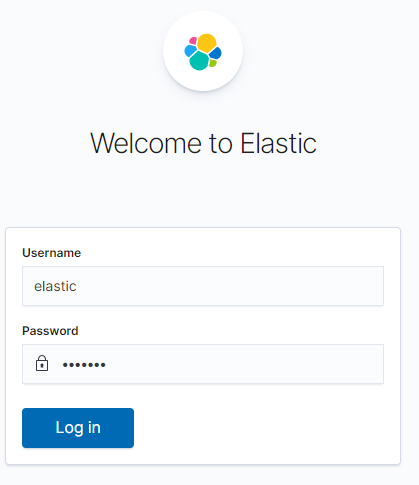
Сюда вбиваем наши логин и пароль из секрета созданного в самом начале, напомню elastic elastic
Переходим в
Stack Management Index Management index templates
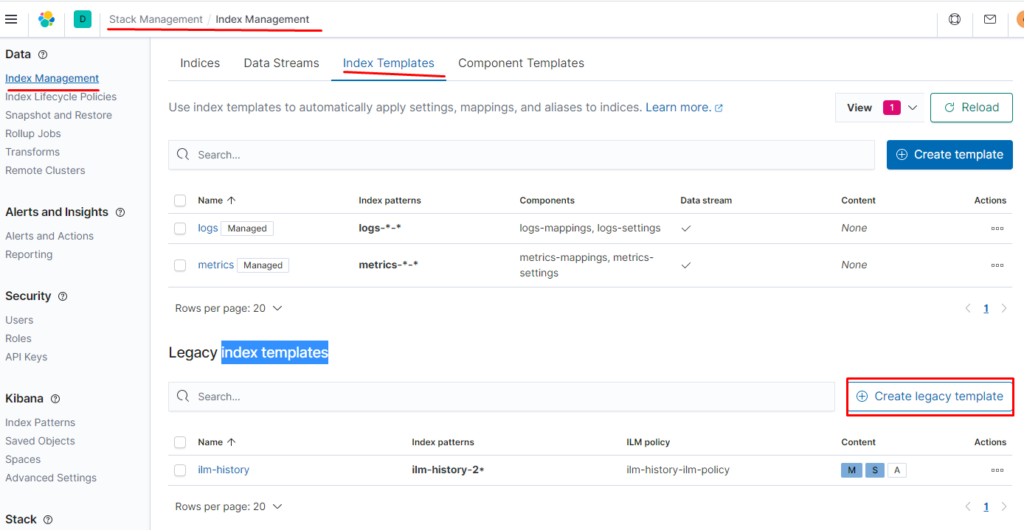
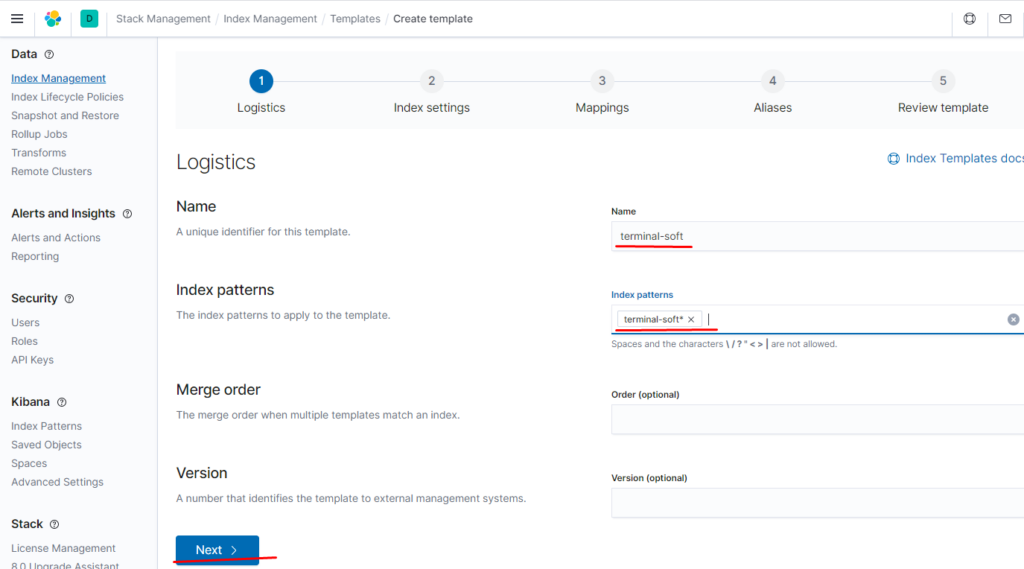
на втором пункте нажимаем next, на третьем пишем @timespamp и выбираем date
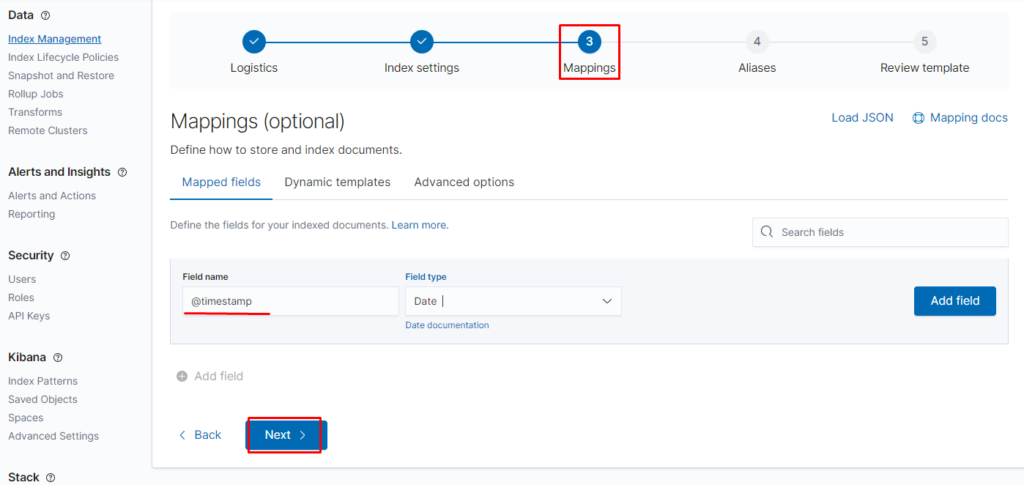
потом нажимаем next далее:
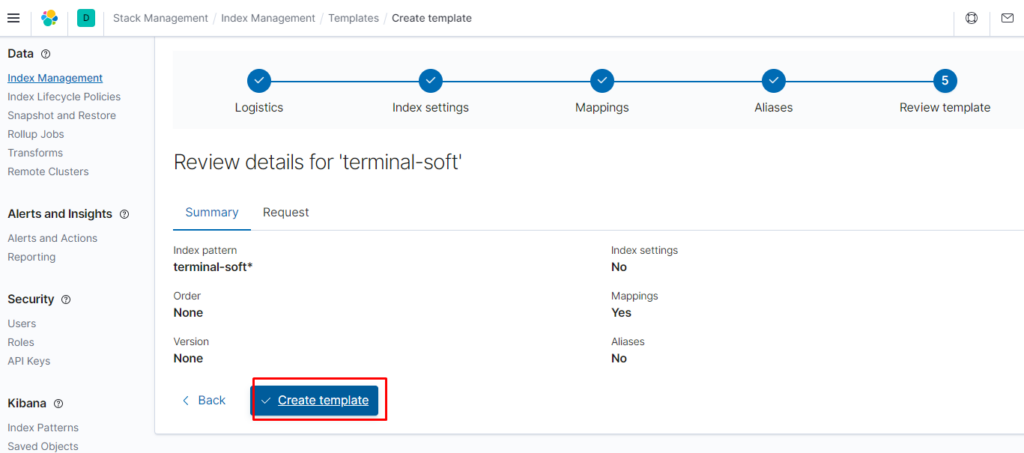
теперь создаём политику на ролловер и удаление
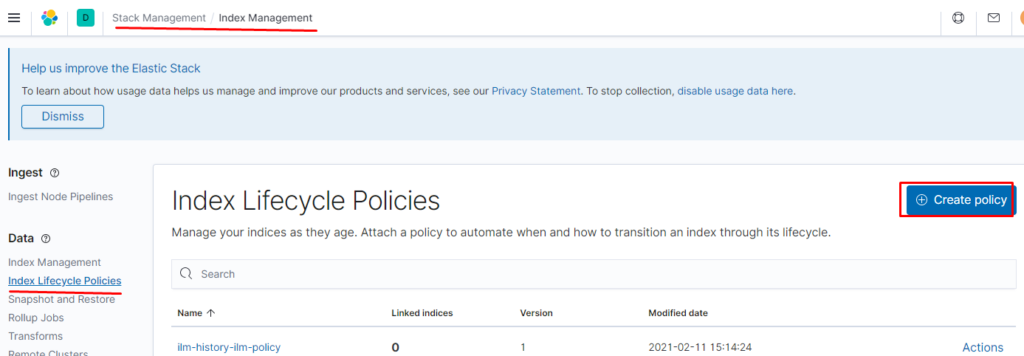
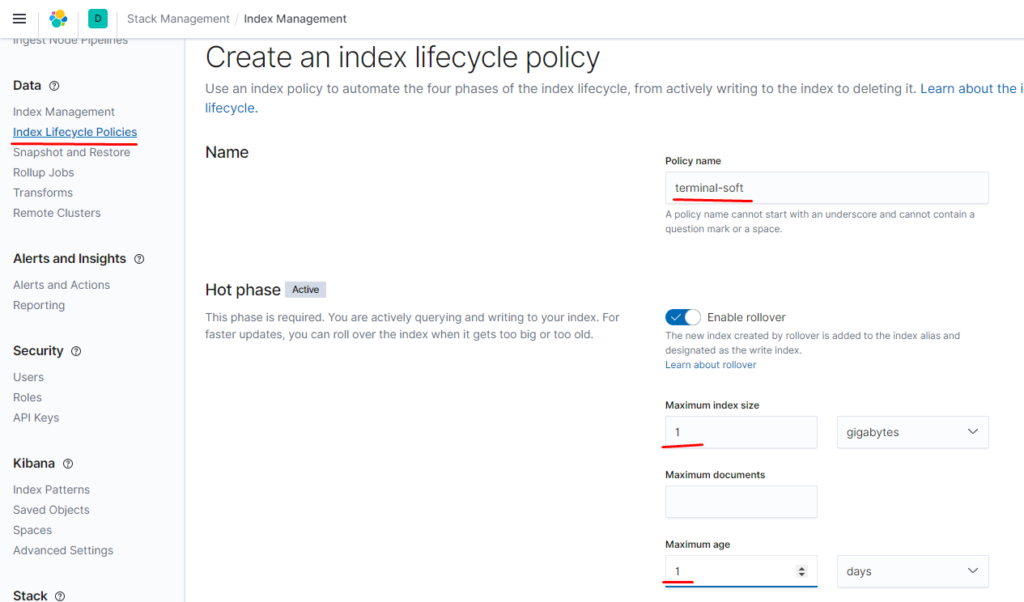
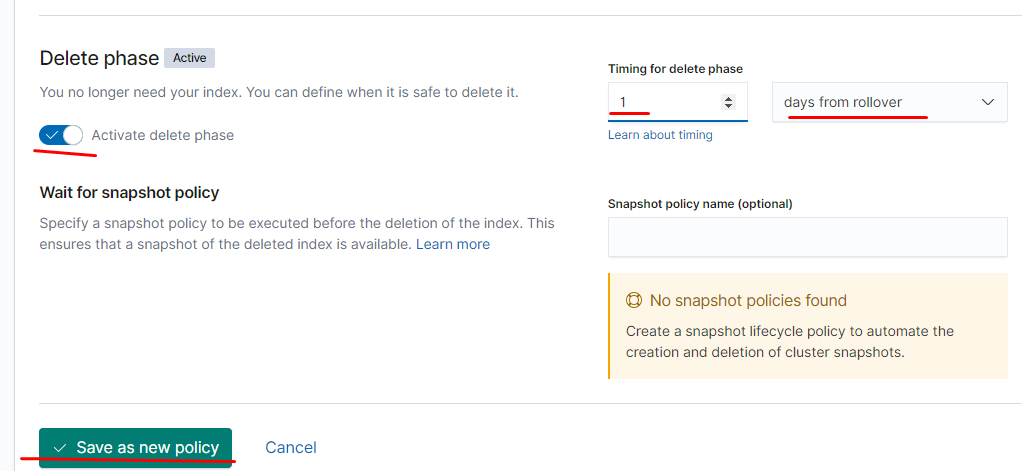
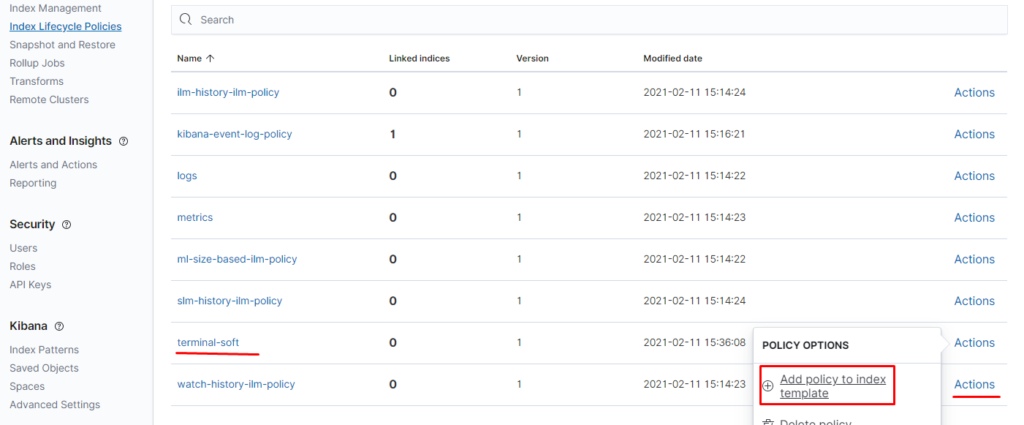
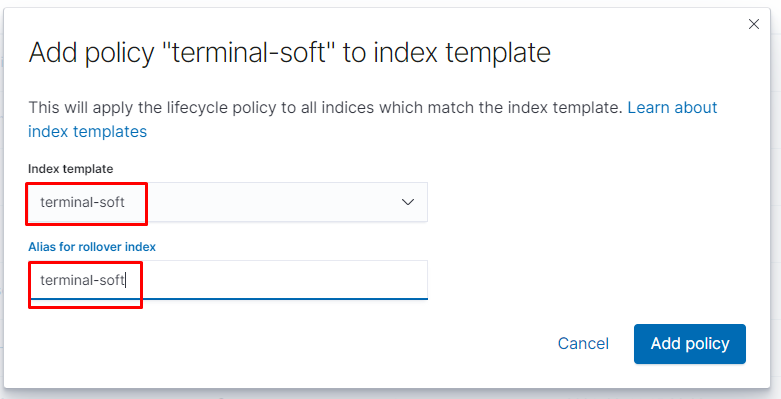
Запускаем logstash и filebeat настраиваем snapshot
[root@prod-vsrv-kubemaster1 helm-charts]# helm install logstash -n elk —values logstash/values.yaml logstash/
[root@prod-vsrv-kubemaster1 helm-charts]# helm install filebeat -n elk —values filebeat/values.yaml filebeat/
теперь создаём репозиторий для снапшотов и их политику
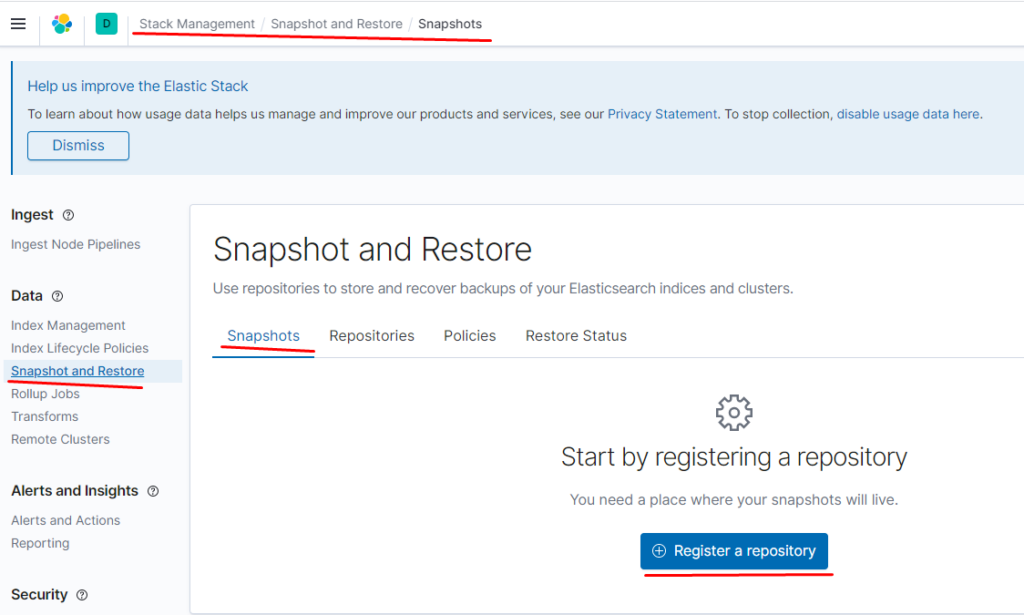
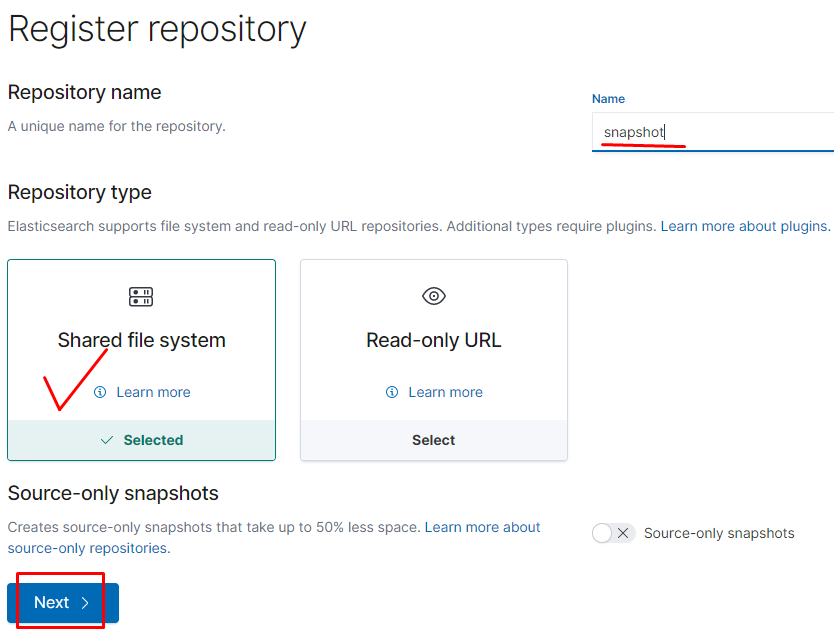
тут указываем нашу директорию /snapshot она подключалась через отдельный вольюм
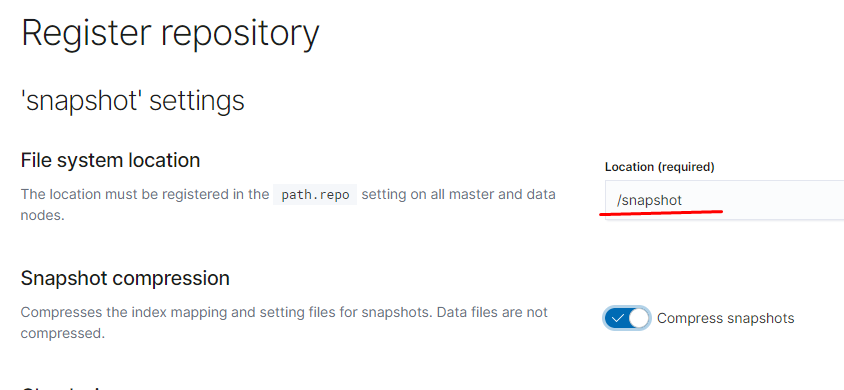
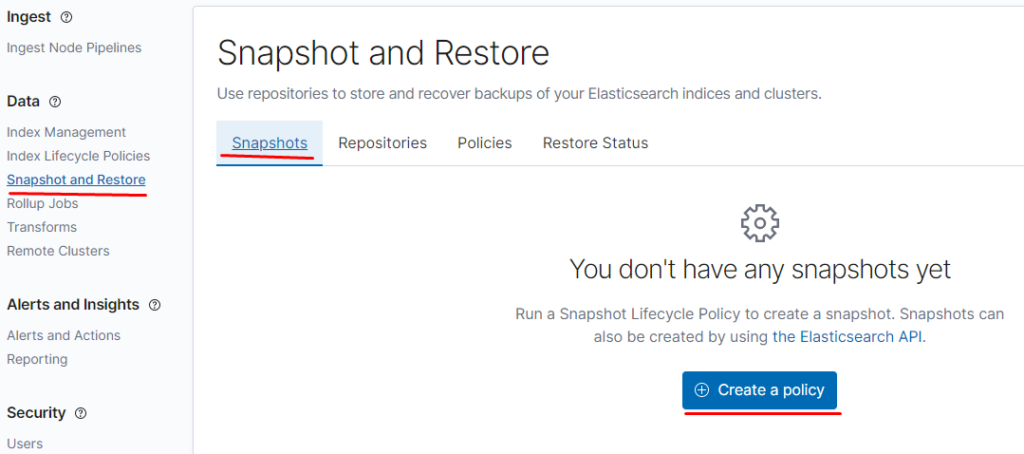
далее вводим
name terminal-soft
snapshot name: <terminal-soft-{now/d}> (кавычки обязательны)
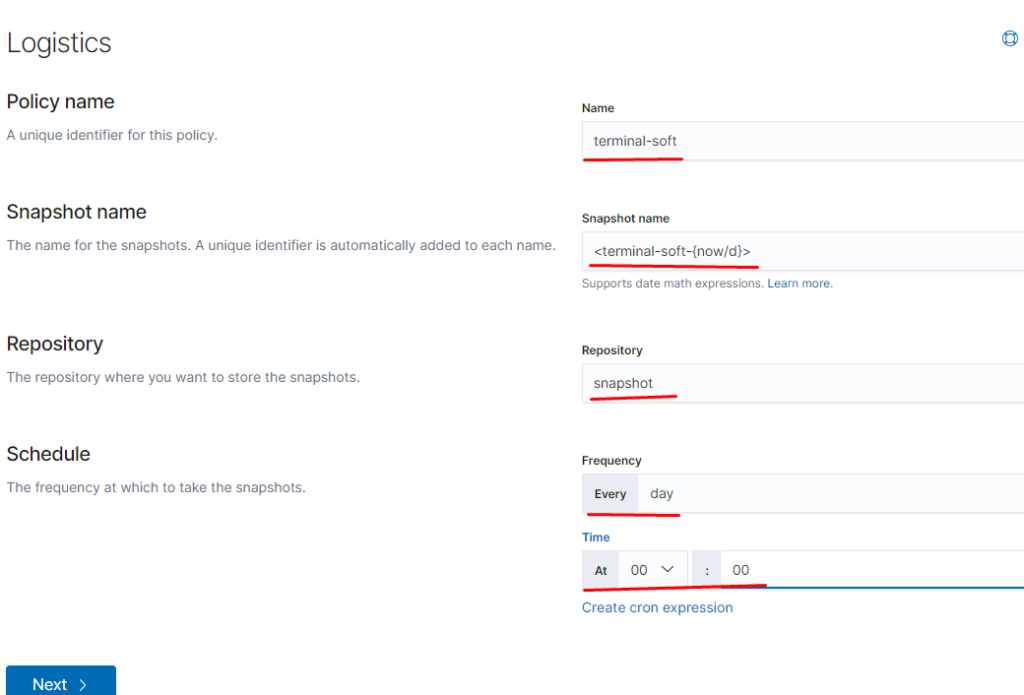
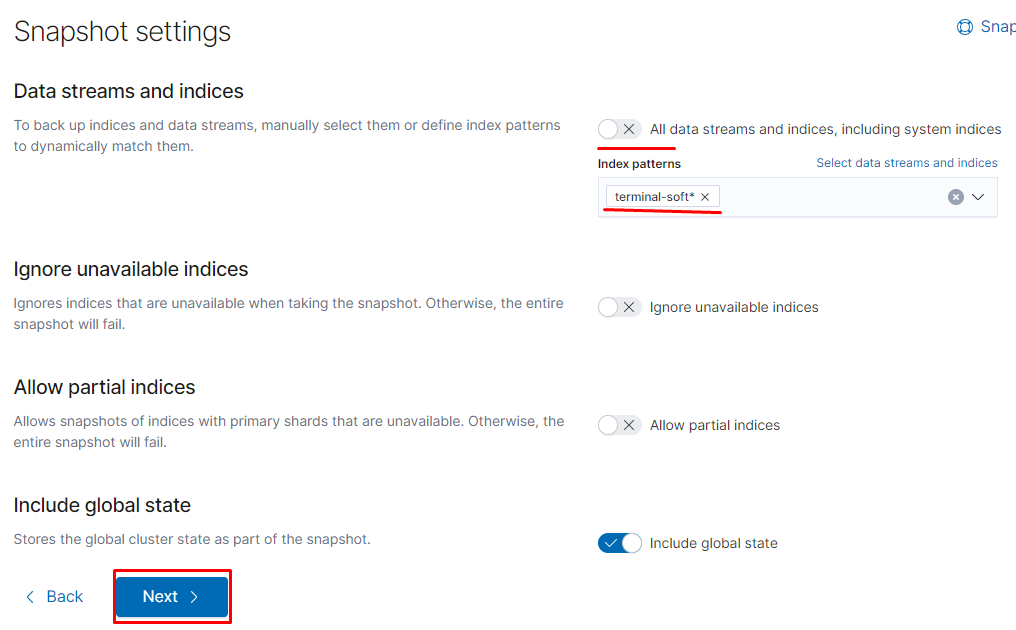
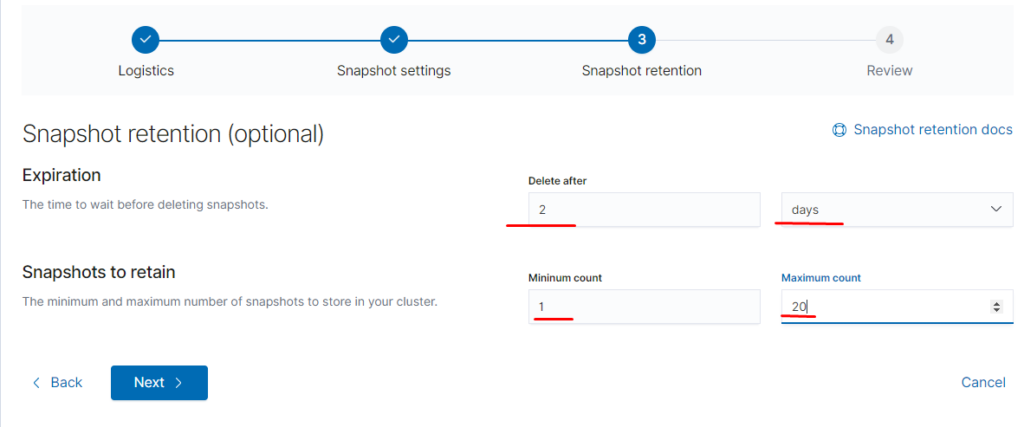
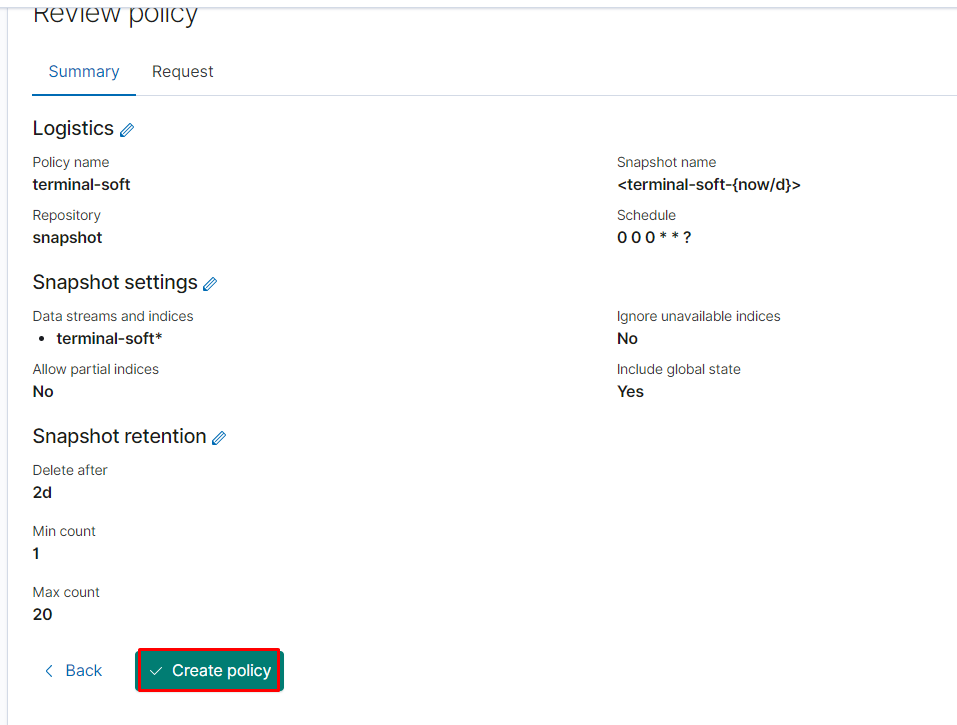
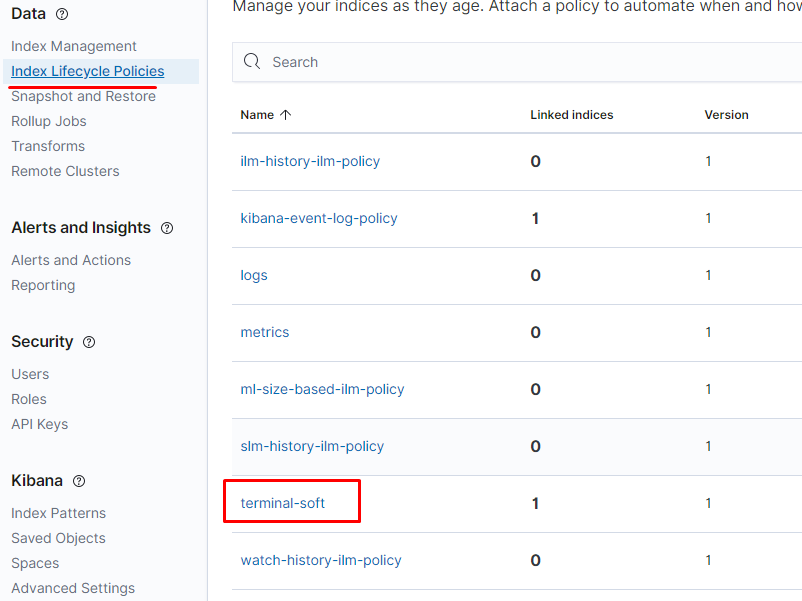
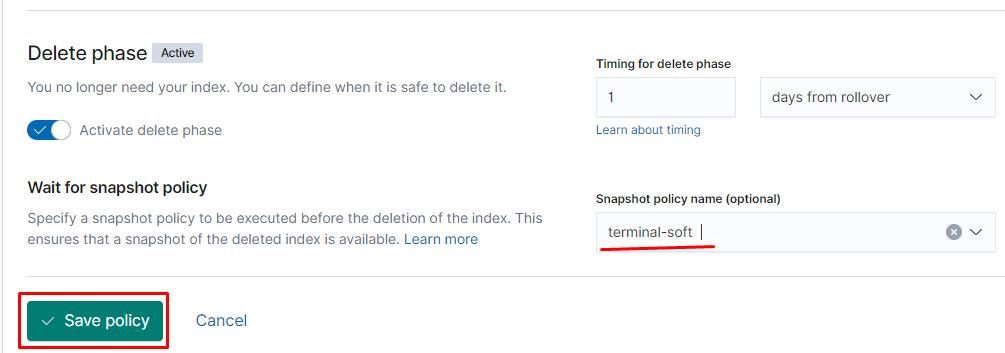
Роли и пользователей можно настраивать тут:
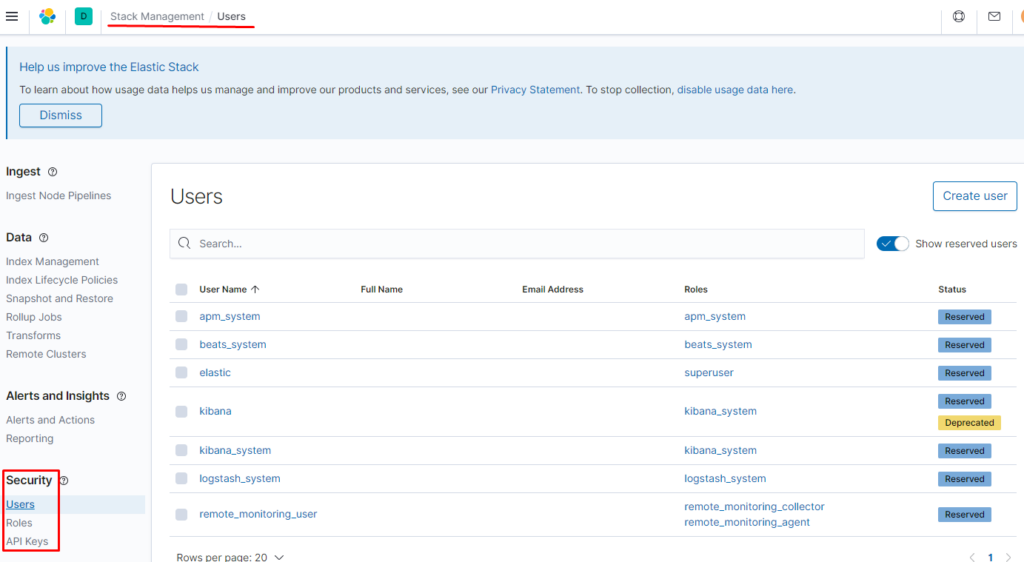
======================================================================================================================================================
запускаем elastic в 1 instance
vim elasticsearch/values.yaml
replicas: 1
minimumMasterNodes: 1[root@prod-vsrv-kubemaster1 helm-charts-7.9.4.elasticsearch-1-pod]# helm install elasticsearch -n elk —values elasticsearch/values.yaml elasticsearch/
[root@prod-vsrv-kubemaster1 helm-charts-7.9.4.elasticsearch-1-pod]# helm install kibana -n elk —values kibana/values.yaml kibana/
Создаём в kibana так же темплейт
Но задаём параметр number_of_replicas»: «0»

после запускаем logstash filebeat
[root@prod-vsrv-kubemaster1 helm-charts-7.9.4.elasticsearch-1-pod]# helm install logstash -n elk —values logstash/values.yaml logstash/
[root@prod-vsrv-kubemaster1 helm-charts-7.9.4.elasticsearch-1-pod]# helm install filebeat -n elk —values filebeat/values.yaml filebeat/
После этого настраиваем snapshot
====================================================================================================
Настройка доступов пользователю для индексов.
Создаём пространство:
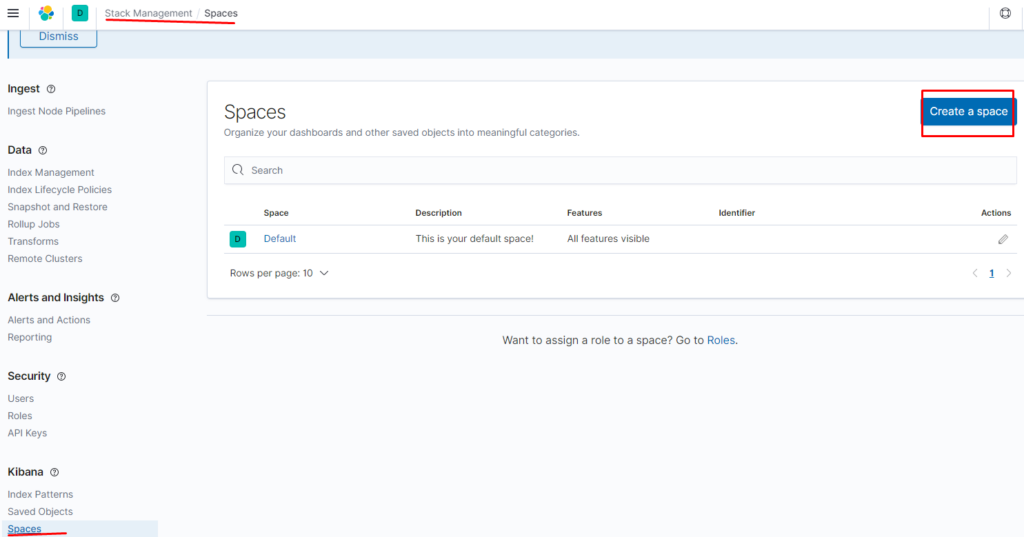
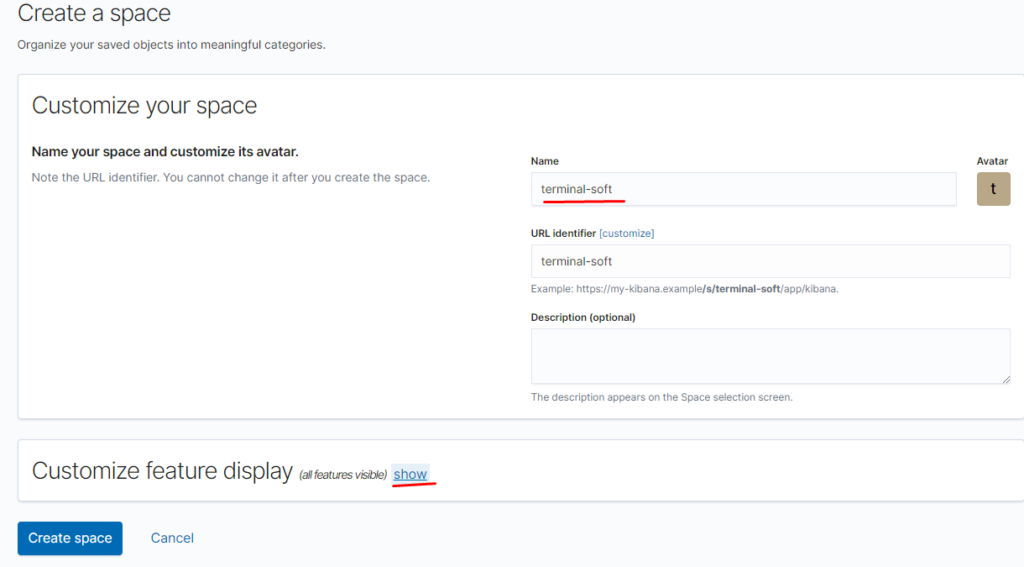
указываем — что должно отображаться в пространстве:
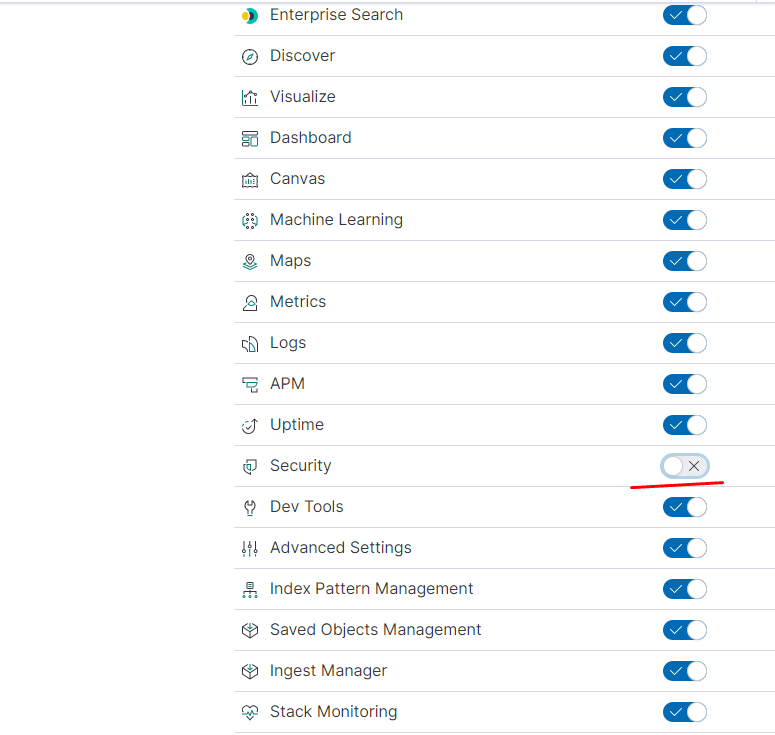

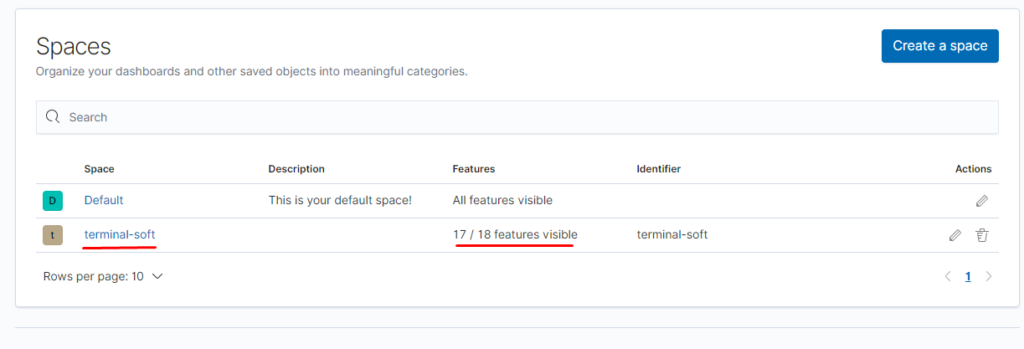
Создаём роль для нашего индекса:
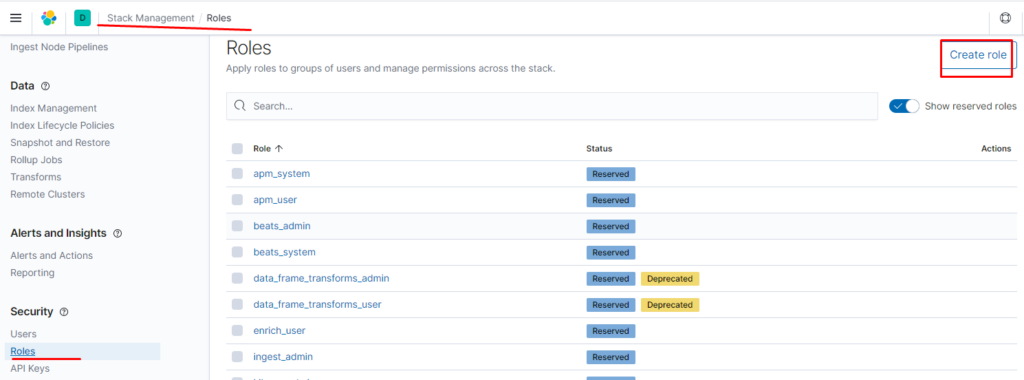
указываем привилегии как для кластера так и непосредственно для индекса terminal-soft
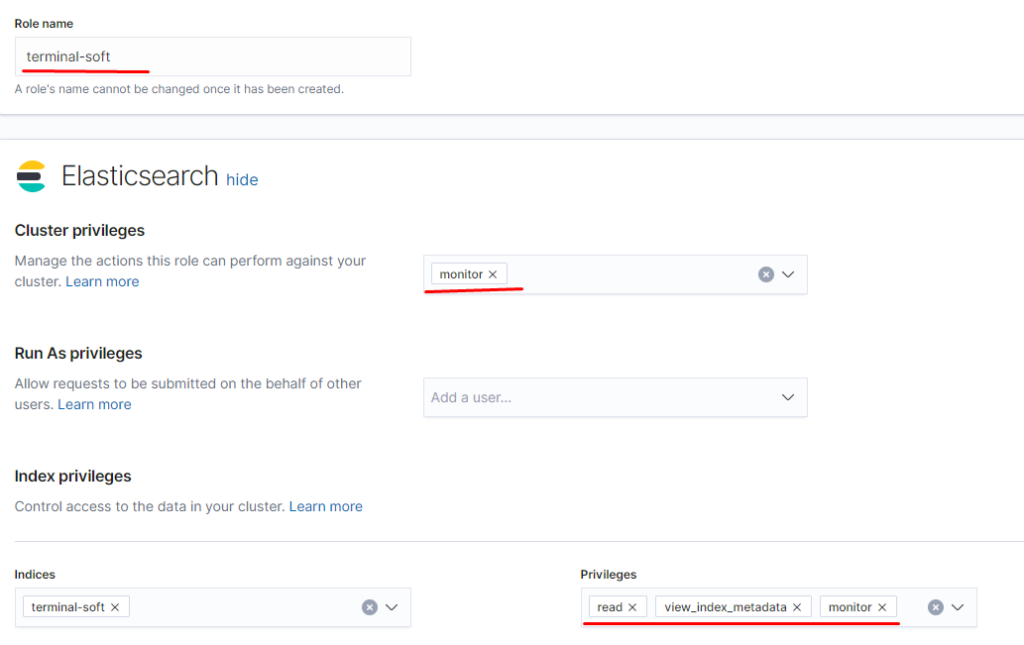
добавляем привилегии для пространства:
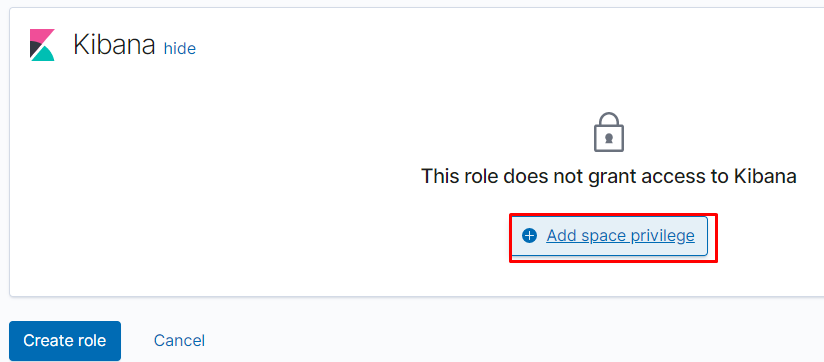
настраиваем доступы для пространства, — чтение/полный доступ/отключить
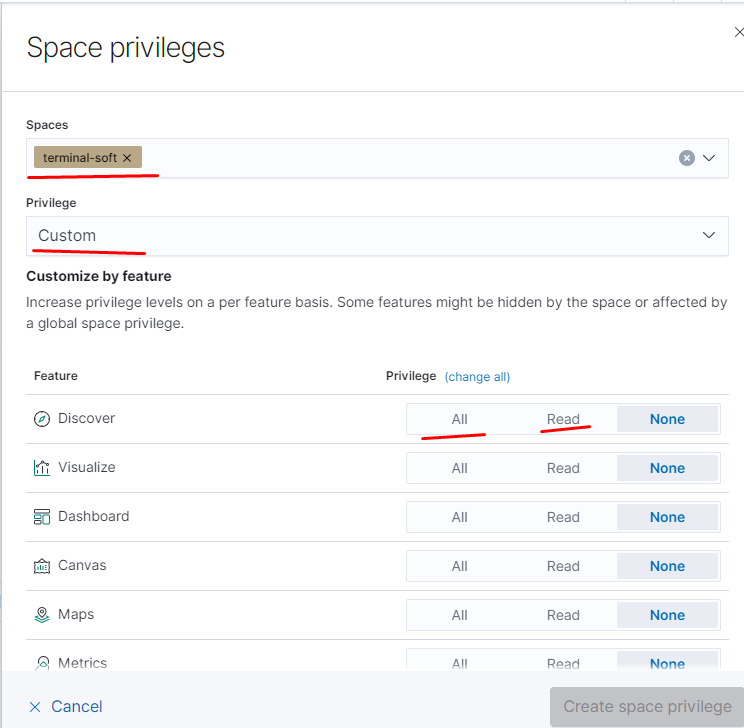
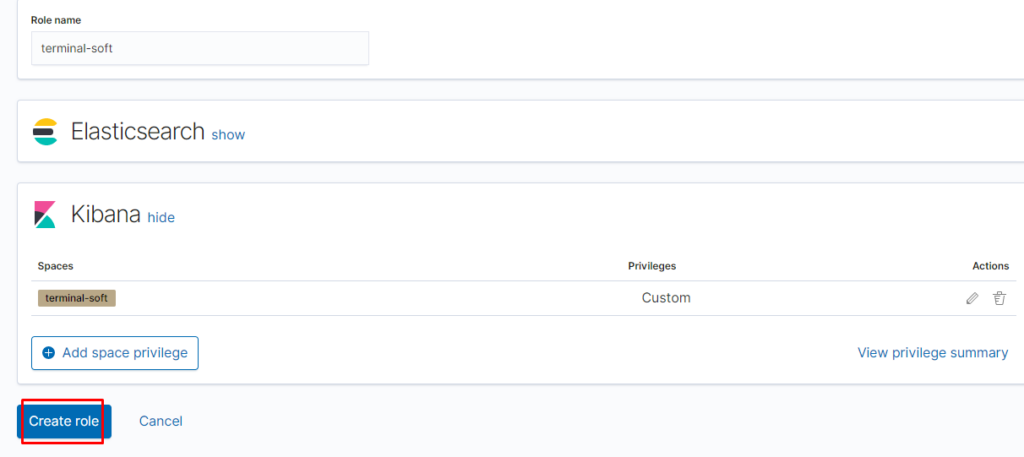
Создаём пользователя:
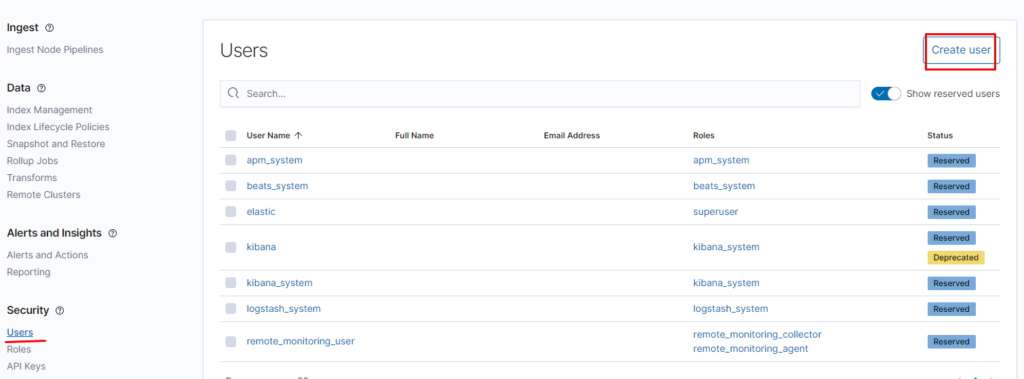
задаём пароль и созданную нами ранее роль:
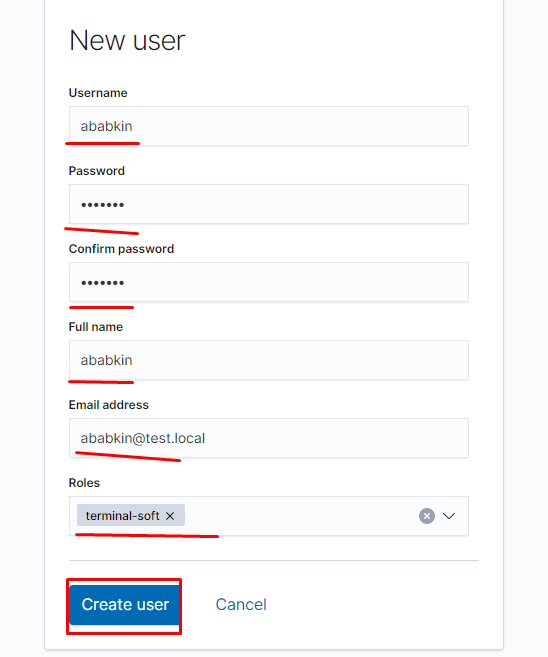
Логинимся под нашим новым пользователем
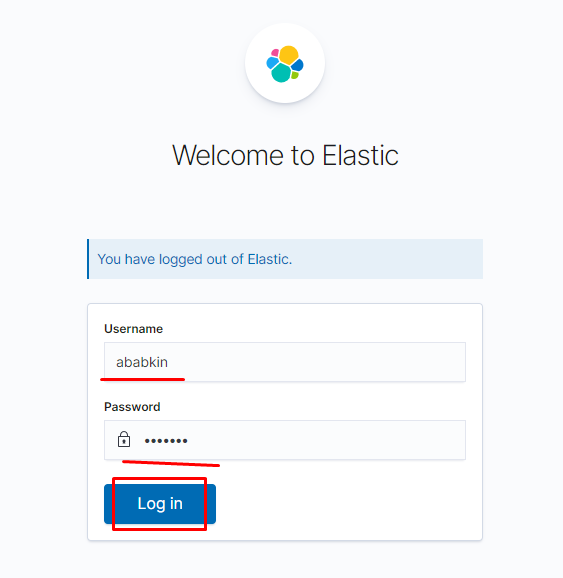
Создаём index pattern
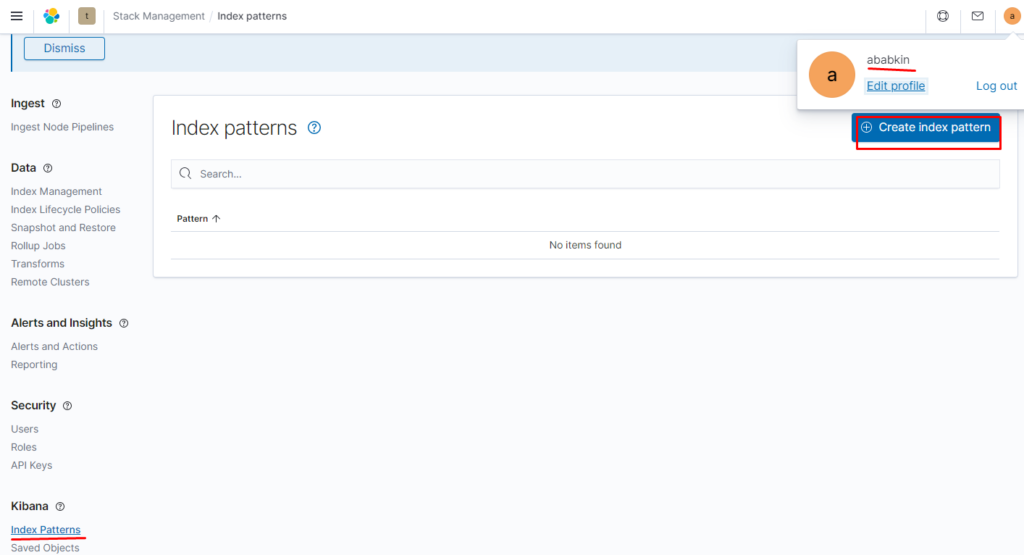
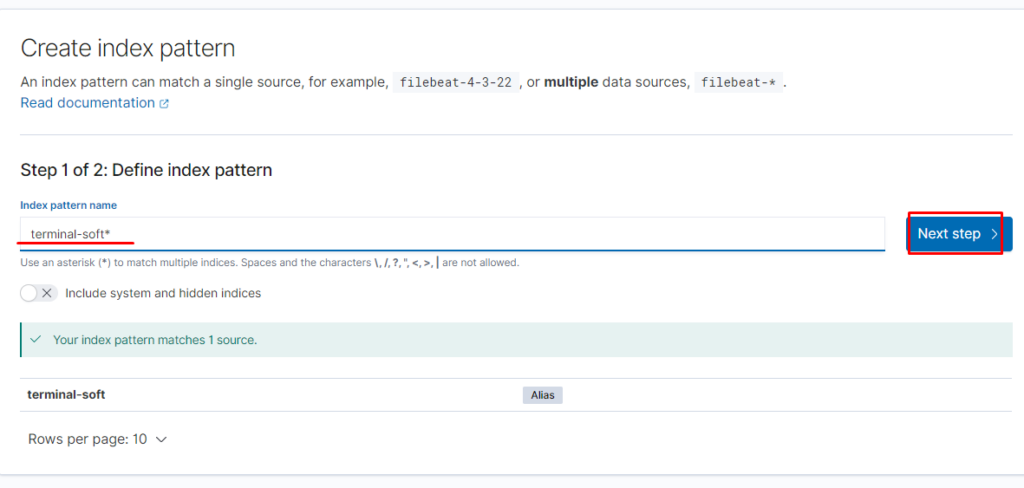
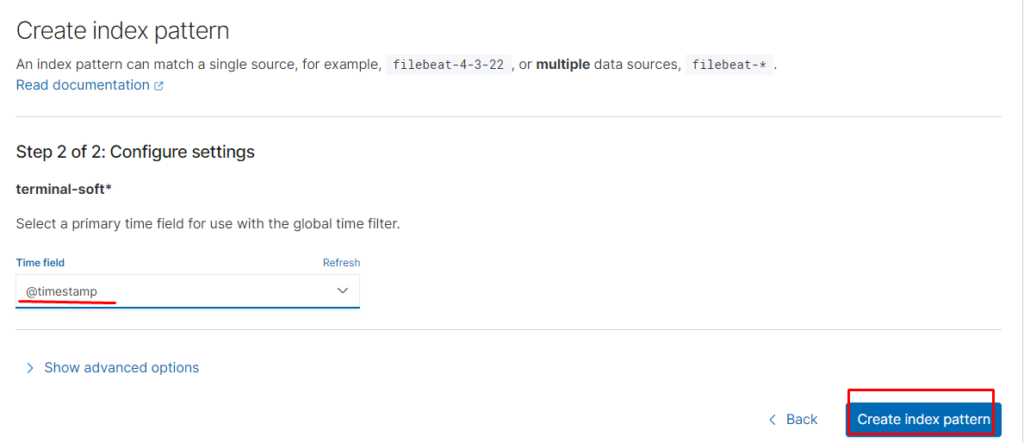
Проверяем:
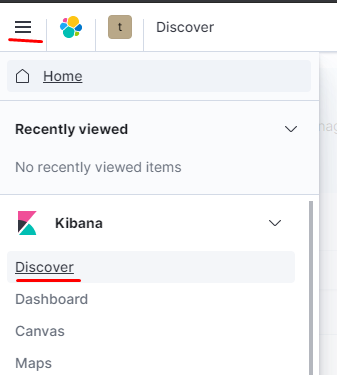
как видим данные отображаются:
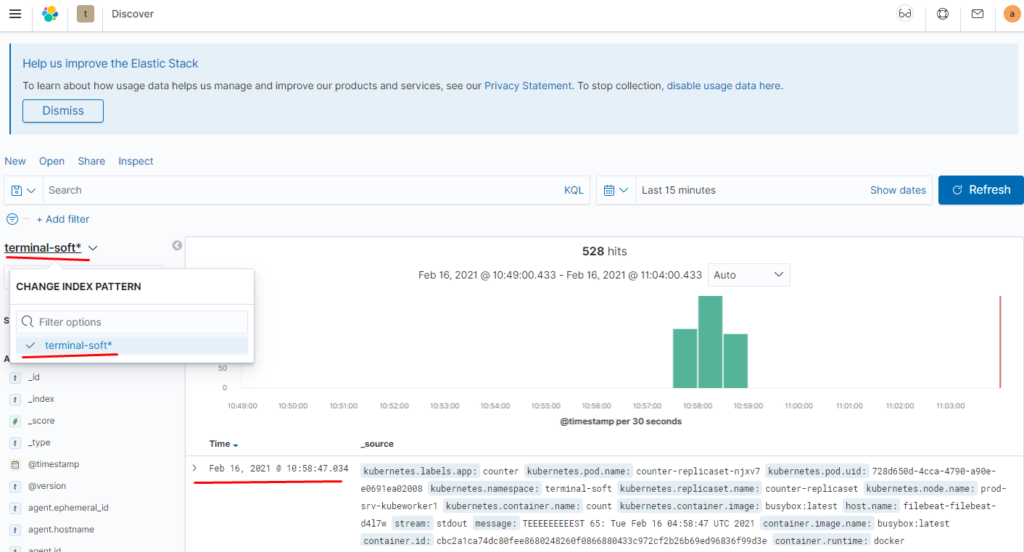
11.Восстановление из snapshot
Если требуется восстановить индексы из snapshot то делаем следующее:
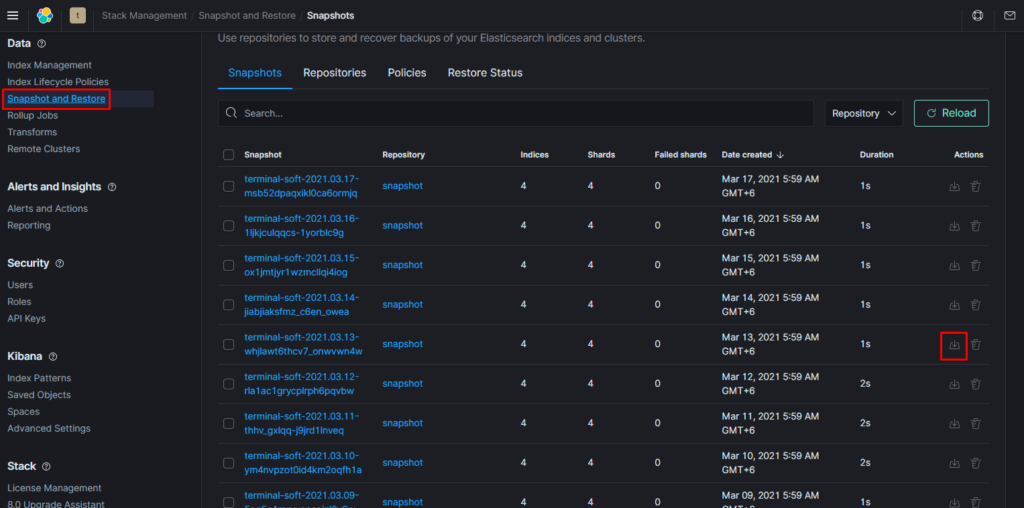
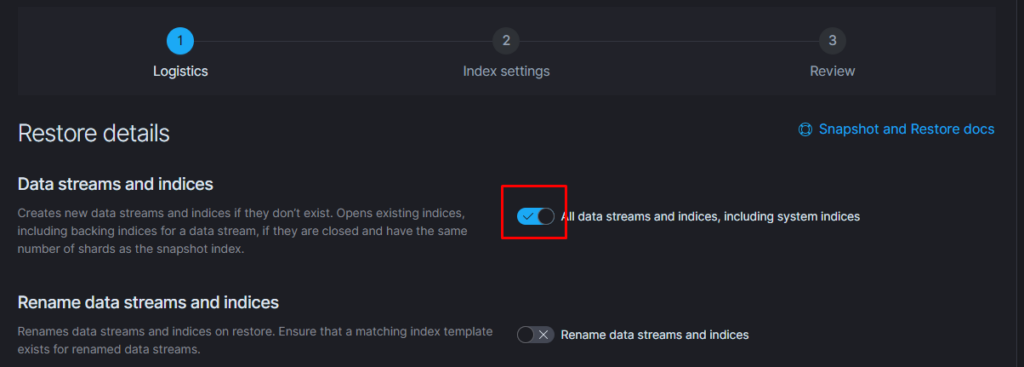
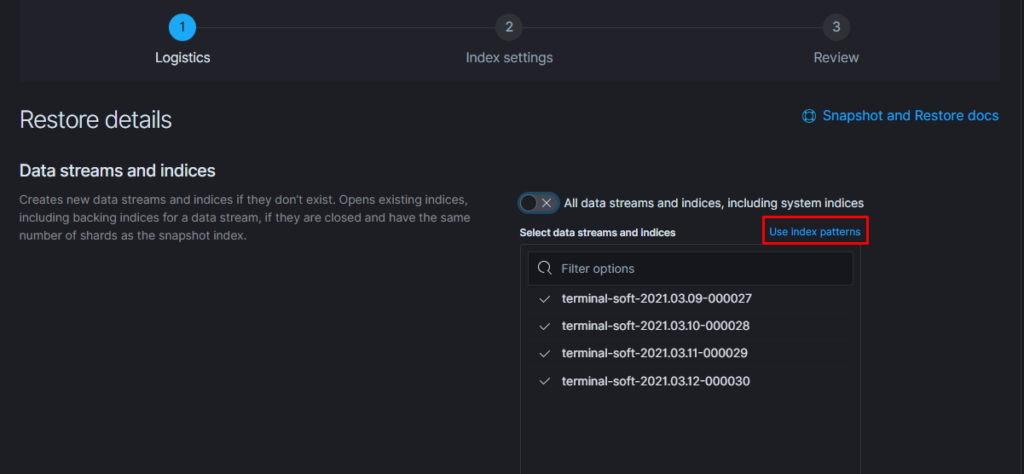
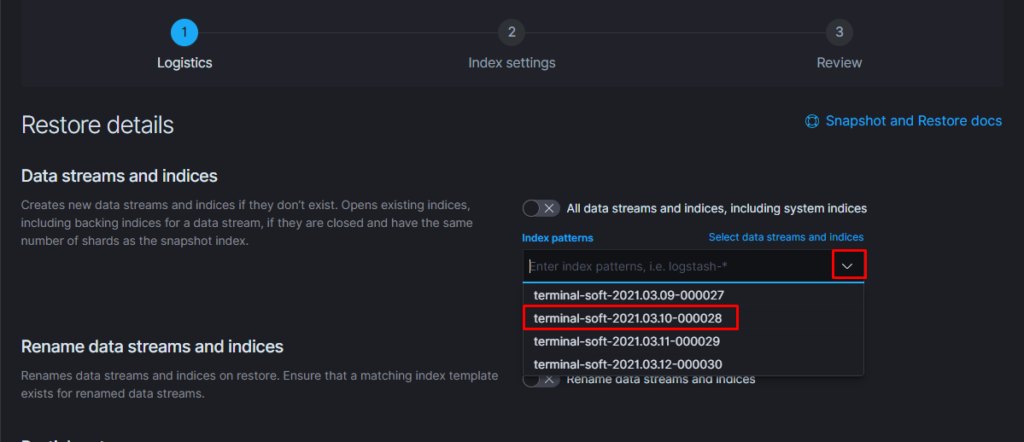
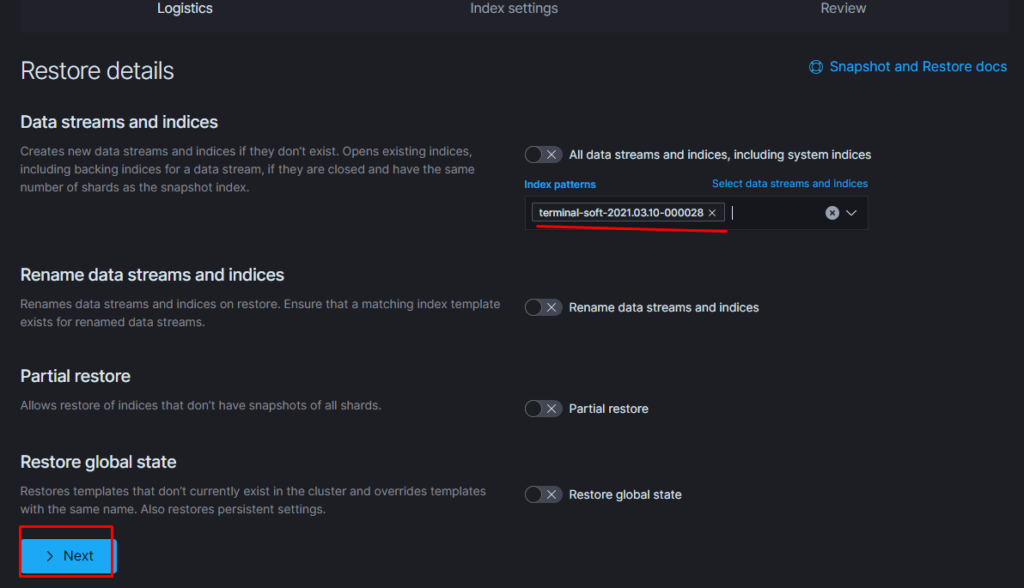
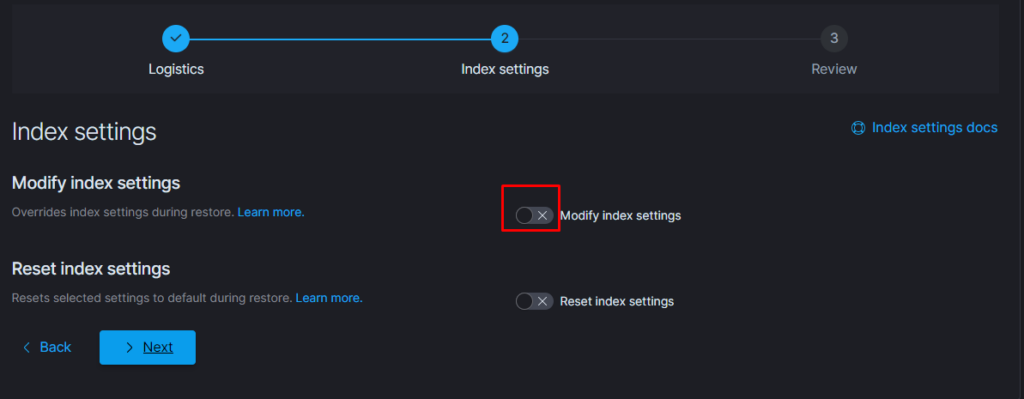
Тут надо добавить параметр
«indexing_complete»: «true»
только в том случае если при восстановлении возникает ошибка следующего вида:
Unable to restore snapshot
[illegal_state_exception] alias [terminal-soft] has more than one write index [terminal-soft-2021.03.04-000022,terminal-soft-2021.03.16-000034]
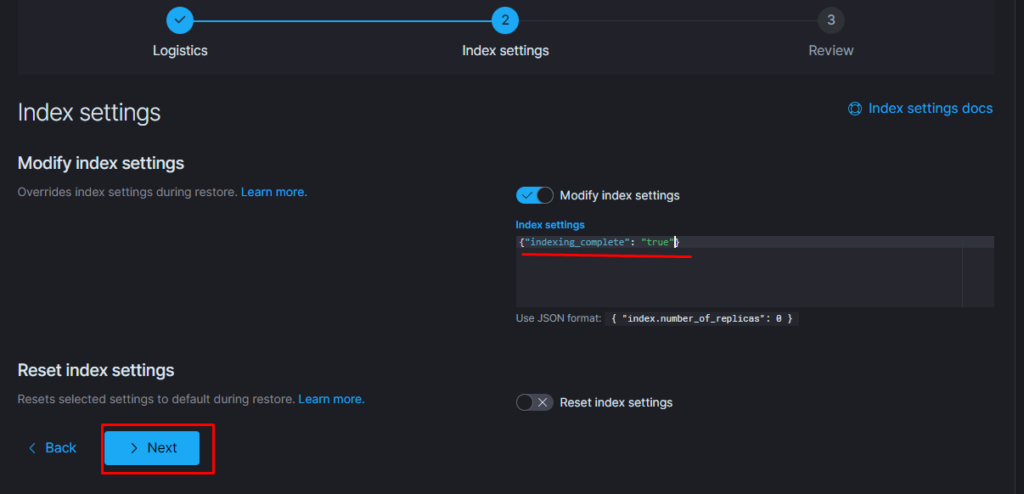
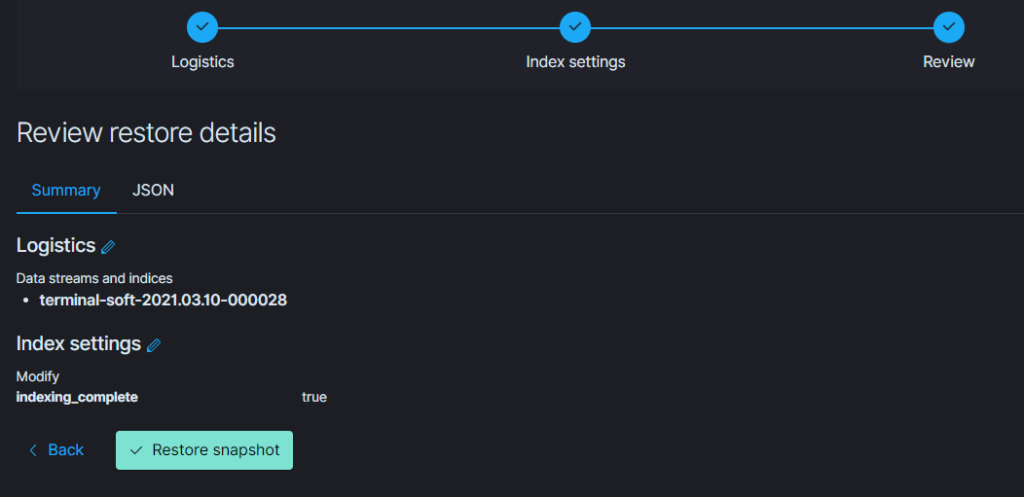
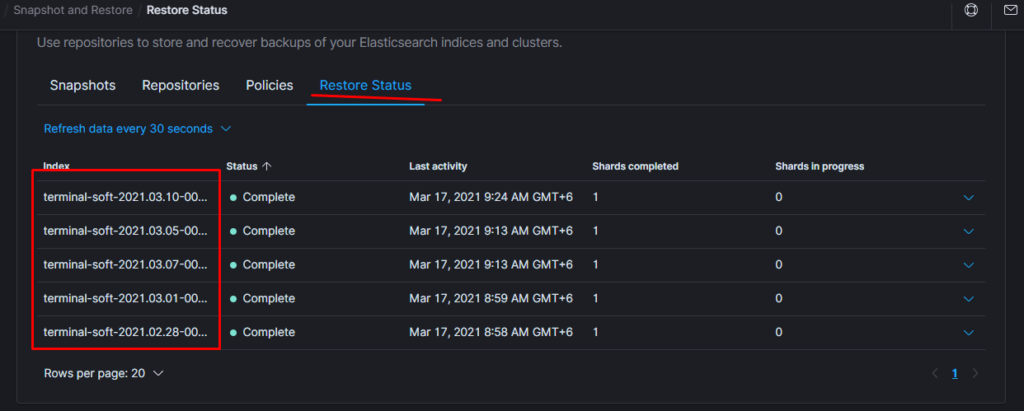
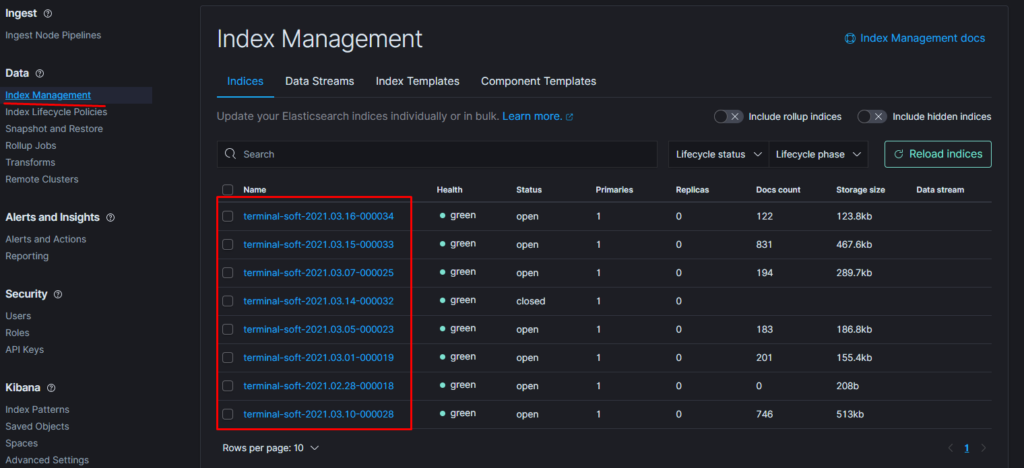
Поэтому когда производишь восстановление необходимо восстанавливать индекс из самого последнего снапшота.
т.е. Если нужен индекс за 10 число то снапшот смотрим где-то за 15 число. Ну или добавляем пераметр «indexing_complete»: «true»
Источник: https://sidmid.ru/kubernetes-установка-elk-из-helm-чарта-xpack-ilm/
Was this helpful?
0 / 0